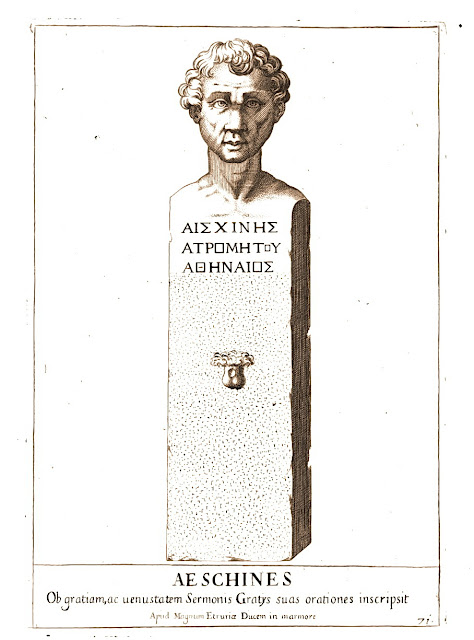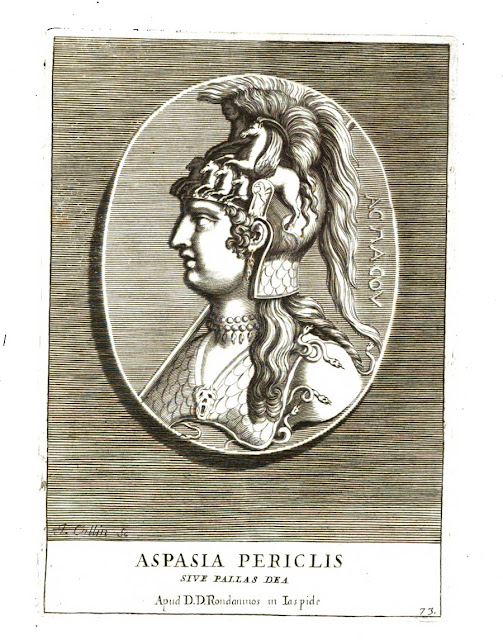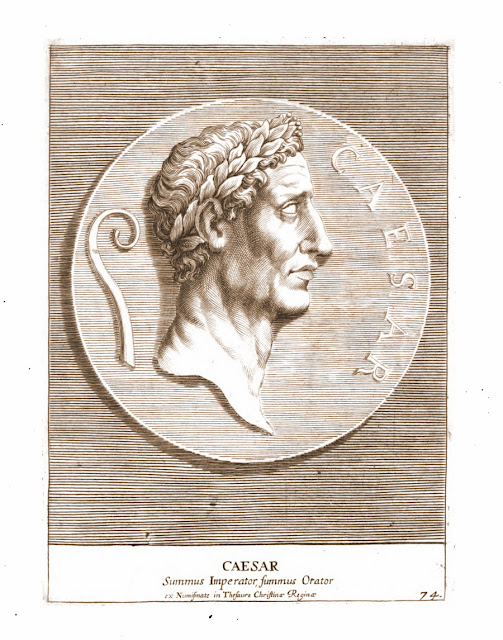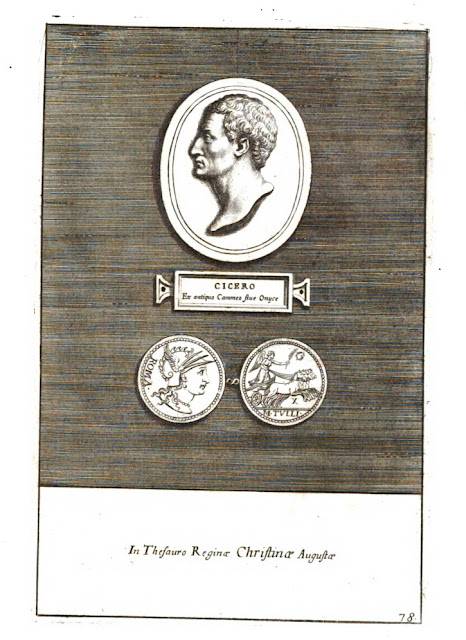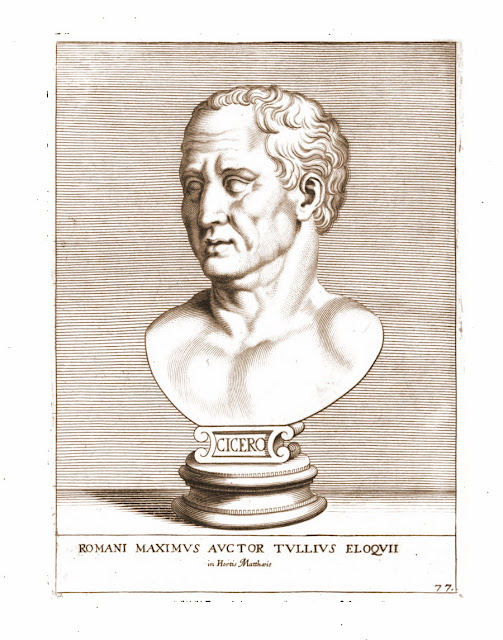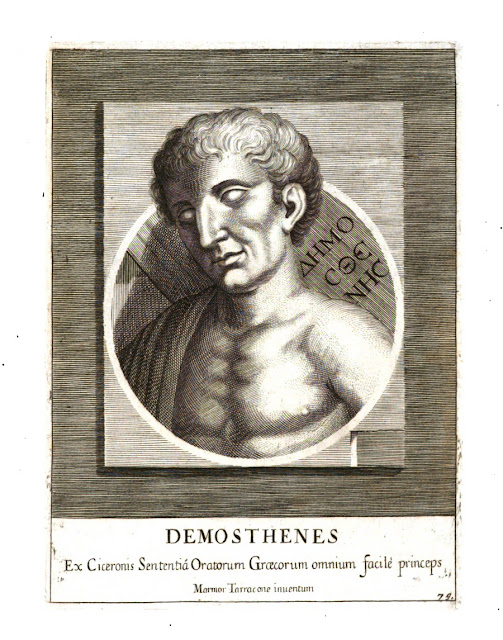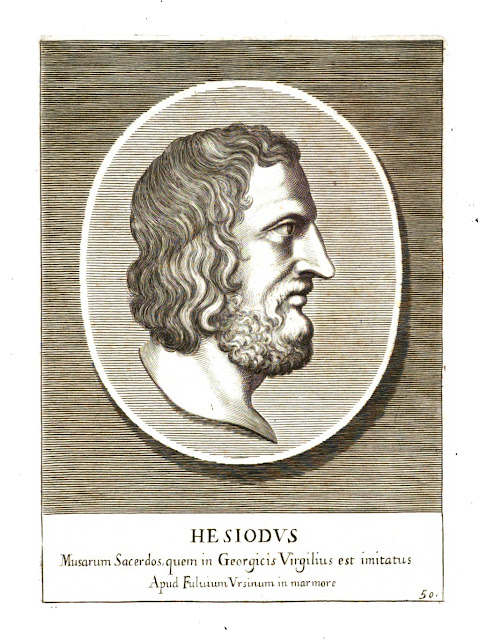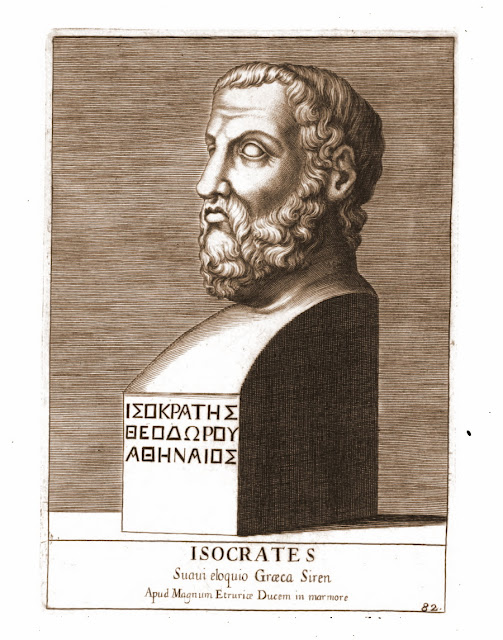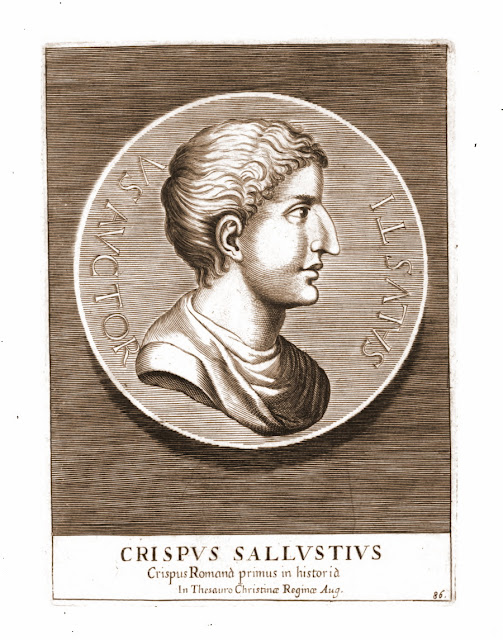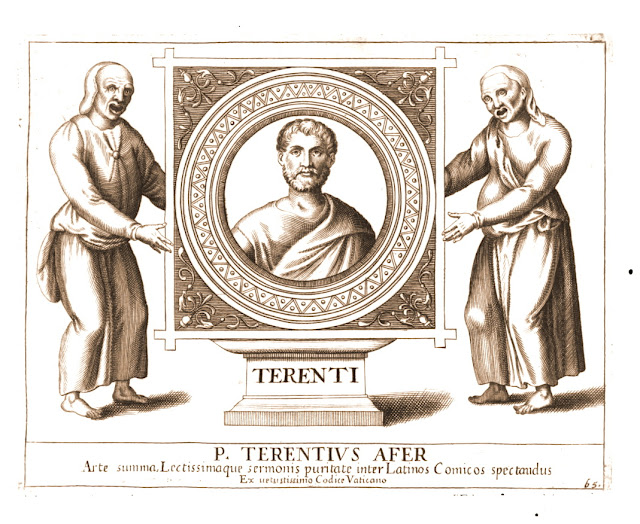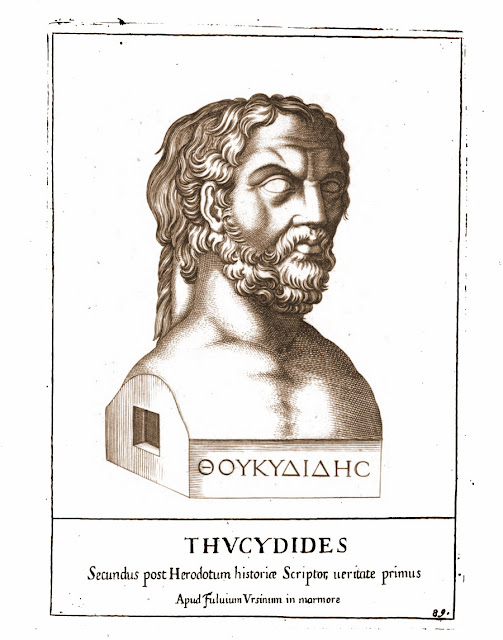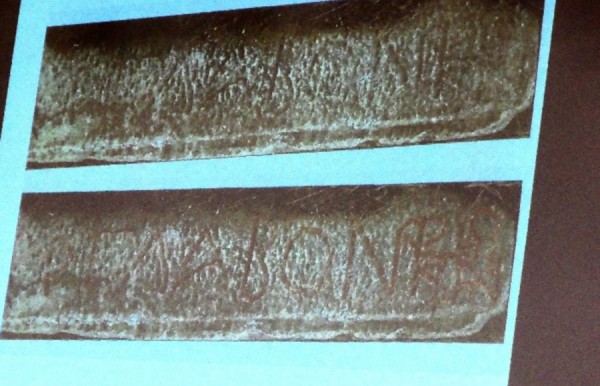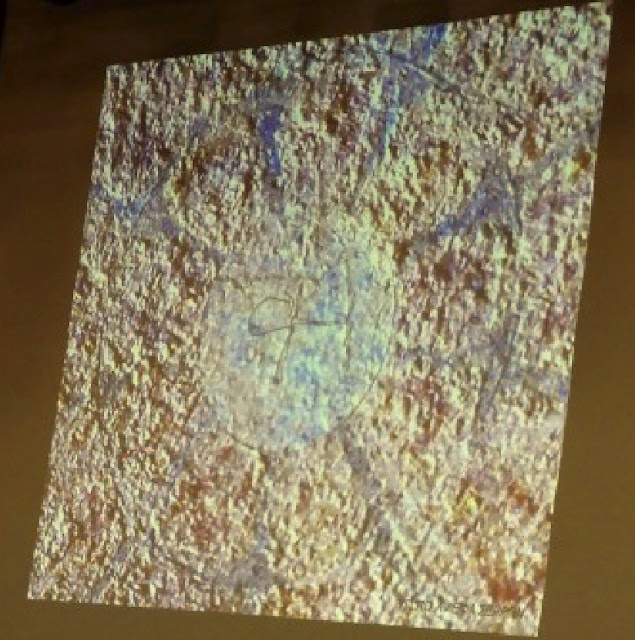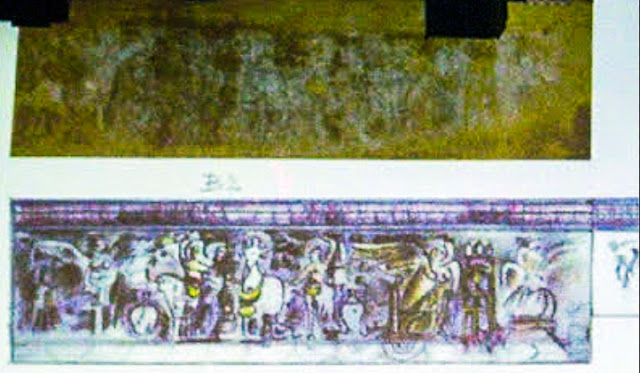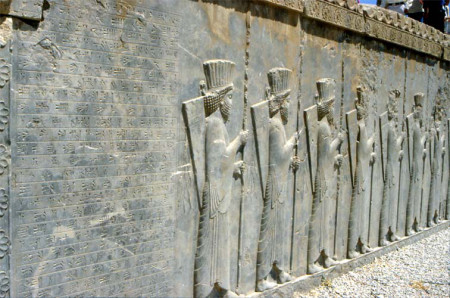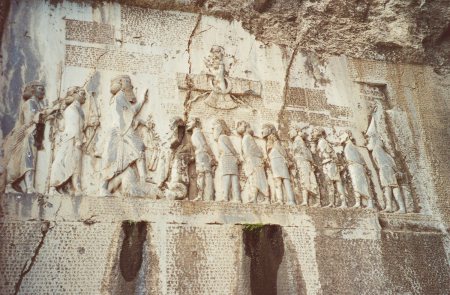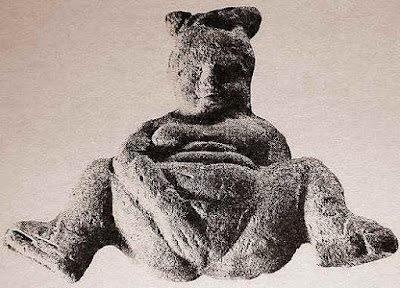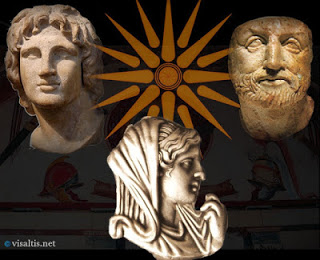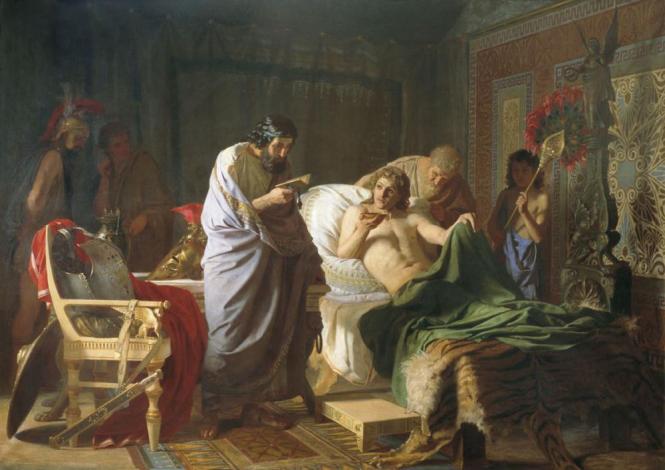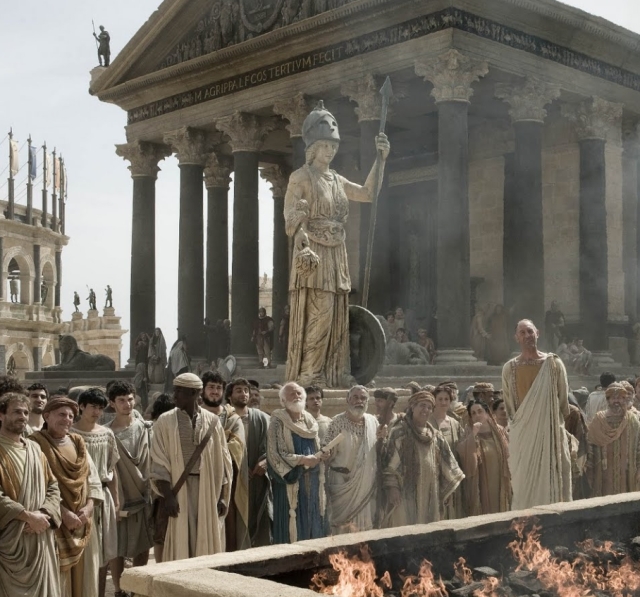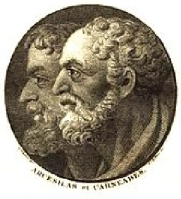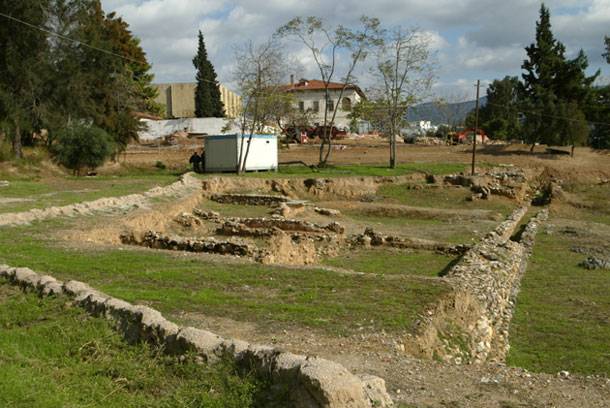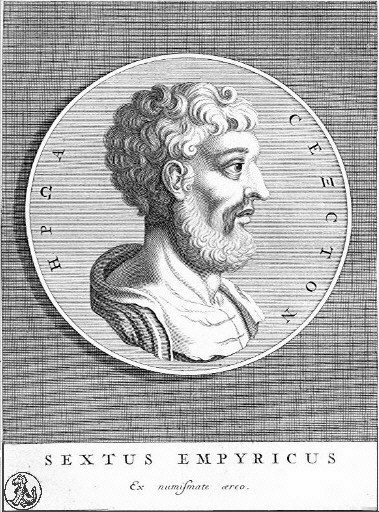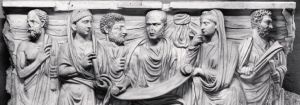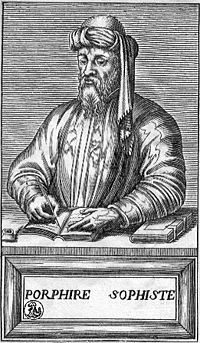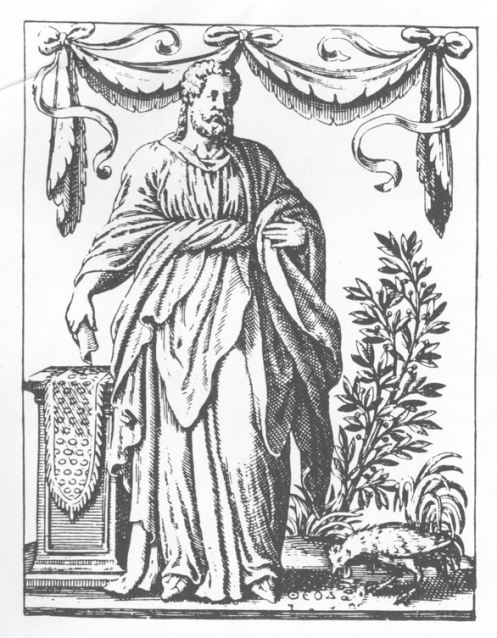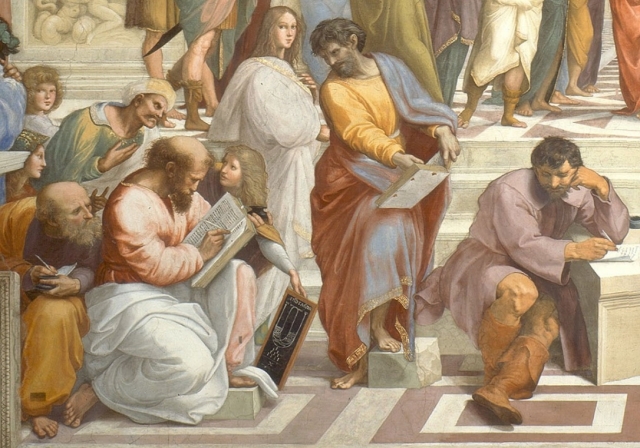Portraits of ancient philosophers and scientists 4 (Bellori 1739)
Category: Selective
amphipolis.gr | THE PERI THE MOUNT PAGGAIO REGION
ECONOMIC GEOGRAPHY OF THE PERI THE MOUNT PAGGAIO AREA DURING ANTIQUITY AND UNTIL THE ROMAN CONQUERING
The term country pangeo, with the vast plains of Serres and Philippi, irrigated by the rivers Strymon and Aggitis, It was in antiquity much fertile, While at the substratum of hiding plenty of precious metals. It was so natural, throughout the course of this region into history, already by the early historic times, anyway and are closely tied to the stock of wealth, I pulled like a magnet cities, peoples and conquerors.

Starting from the flora of that country and from t "agricultural products produced in the land of, We are obliged to stand first and "devote a separate chapter of this in our article" a product that until now gives the area the most distinctive identity. This is t "vineyards and wine of Paggaio and especially the current Symbol conditions, (which the ancient Greeks didn't commonly resolved by Pangeo), that the abundant and long-lasting presence testify, Apart from historical sources, numerous shells craters and oinochown located in the ruins of ancient settlements of the region.
Amphipolis.gr | ALEXANDROS AND FILIPPOS ON MAKEDONIKI PARADOSI
(from Abbott's book, Macedonian Folklore, Cambridge 1903, p. 279-289)

"Anything smells Antiquities", says Abbott, "attributed by the villagers of Macedonia in two great kings of this country. The songs and their traditions, for which they are very proud, consider that relate to "years of Philip and Alexander-and of Hercules", a condensed period in which share all remnants of the past with impeccable fairness.
Going from Drama to Kavala, and a little aside from the road, are the compact remnants of an ancient gate that faces towards the ruins of Philippi. This building remnant known in the popular masses as "the Palace of Alexander the great".
In Ntemir i.e. "Chissar Sidirokastro», on the railway line Thessaloniki-Serres, There are remains of an old Castle or fortress, overlooking the Gorge, on the sides of which the town is wedged. These ruins are attributed to King Philip. A stone container that was discovered in the Gorge a while ago, immediately dubbed safe or vault of King Philip. The same romantic tradition distinguishes, two smooth stones that lie on the rocky shore of a local river which crosses the Gorge, "laundry room" on which the King's daughters, the daughters of King Philip, go and leykainan their clothes, just like they do the "Macedonian women" until our days.
The two individual rocks on the plain of Serres, already mentioned as «Drakopetres»(1), called by residents of Nigrita "Stones of Alexander the great", implying that he has thrown. Didn't had lived in an era in which, According to remarks from a agwgiati, «God tried them antreiwmenoys»;.
Also, near the village Cross, on the East coast of Halkidiki, just north of the location where they are placed by many stageira, the birthplace of Aristotle, an unnamed mountain rises on maps that are known to the villagers as "the Mountain of Alexander ' or, less rightly, "Alexandra", a designation of particularly successful in a range of associated
with the name of the famous teacher of Alexander.
South of the Cross lies the village Lymtziasda, locals trace the name of the mother of Alexander (the Olympiad), a reduction of the ' not unlikely "according to Leake. The browser that renders, less well, the name of the village as Lympiada and on the etymology notes that the failure of the initial "o" and the conversion of Lympiada to Lymptziada under the ordinary course of lesions due to the influence of Latin language after the Roman conquest.
In the same paragraph the Leake notes that "in a location just below the Palace of Aga of the Castle, where some remains of columns are still visible, It is said that were the Mint of Alexander.
Both the Turks and Greeks, even the poorest villagers, It is impregnated with the history of Alexander, Although sometimes this story is eerily distorted, and not infrequently confused with Alexander Skanderbeg».
Spell the name of Alexander the great used to banish the demons of tornado is yet another example of the strength of tradition, and also highlights the amazing Halo which, during the centuries of ignorance, has gathered around the personality of the great King. In popular perception Alexander fills an aspect similar to that held by the Solomon on Arabian nights and other oriental compositions. Credited with a mysterious power over the spirits of evil, and his name is able to exorcise………………………
……..It need merely be pointed out that the narrative under the popular name “Hero of Alexander the great”, It's long been a favorite readings of the lower classes throughout the Greek world, and has helped more than anything else to keep the memory of the great conqueror(3) fresh and confused. Many such tabloids sold annually to the peasants of Macedonia by itinerant booksellers and by such a hero gained with the paltry amount of a piastroy, equal to 2,25 Sterling (2)….”

COMMENTS:
(1) At pages 263-64, Abbott (evoking the work of a. d. Gousiou "in country Pageon…», Leipzig 1894) notes that the ' Drakopetres ' (or "Stones of Alexander the great", in the Nigritini version) is "two lonely rocks on the plain of Serres, not far from the village of Lakkovikia ", (old Mesolakkia, about 7 km east of today's New Mesolakkias). From the description of the Gousiou (p. 27) It is concluded that the Drakopetres were somewhere close to today's New Mesolakkia.
(2) Abbott, as yposimeiwnei, named ' Hero …», refers to the version history of Alexander of Makedonos: Life, Wars and Death. ', Athens, (J). Nicolaides, 1898. Stresses also that the tale of Fylladas has the principle of the "Pseydokallistheni" who first appeared in Egypt in the 2nd century b.c.. and exposes an extensive summary of the text.
(3) The thrylloi for the Megalexandro continue and in younger years: They said earlier that, as zeygarizan fields in the Moyggila BARROW (between Xylotroy and Fytokioy), the plow skalwne in jars and in large stone slabs. And the popular imagination did its "diagnosis" or that old village (Xylotro) they were in Moyggila or that there is the tomb of Alexander the great!
And to …argument's sake: "Within the torrent of Terpni, among the passages in Xylotroy (sic) and Fytokioy …in the energitheisas there in summer 1950 skafikas under the … YSSYEM, ruins of aggeia Tina, of which simantikwteron was erythromorfos Bell crater by means of the 4th century b.c.. (Annals Of Archaeological, Anaskafai …in Macedonia and Thrace …1940-1950, C. I. Makaronas, SLE 648). Please note that the torrent of Terpni "glyfei" Moyggila BARROW located (for those who know the area) among the erstwhile "tsiaϊria" and "siafaria" of the Xylotroy and the Tsiarpis'no River (cheim. Terpni).
I.e., proving once again that the folk tradition has its roots, almost always, in some real fact.
Picture of beautiful erythromorfoy vase and topographic Moyggilas area where found, and as shown in above post, are listed below.
Amphipolis.gr | The ancestry of Alexander and the Macedonians
Eleni Michalopoulou, Lawyer

Documentation in the texts of ancient Greek Grammatologias (Herodotus, Thucydides, Plutarch, Arrian, Demosthenes, Polybius, Isocrates).
INTRODUCTION
On this note aytonoitwn. Because, though, Why is becoming more and more common for the obvious, is, Maybe, useful, immersion one-for a while- in these. A recent, the ancestry of Alexander and the Macedonians, my study on the work of major ancient Greek authors (Herodotus, Thucydides, Plutarch, Arrian, Demosthenes, Isocrates, Polybius) led to the documentation of known, more or less, arguments for the question. Because the semantic value of the name, as Word, It is a more serious affair than,What could assume someone, -particularly when it comes to name history, very-important and erizomeno, like that of Macedonia, worth to throw a careful look at what record historians of antiquity.
(J). THE THOYKYDIDIS
Starting from the beginnings of references to the term ' Greeks ' hold that Thucydides, of the greatest historical and political philosophers humanity says that before the Trojan war was not the term ' Greeks ' and that the first time we meet him is in Homer, as a designation of those who battled against Troy, from Fthiotida, under Achilles – ' the first Greeks ' [1]. Homer, continues Thucydides, the ' Greeks ' refer to the same concept referred to the ' Achaeans ', the Argive ', the Danaoi '. In the Homeric epics do not meet, Besides, Neither the term ' Barbarians ', because they had not yet sorted (much more established, as was later) the term ' Greek ' "as oppositional total name"with the ' Barbarians '[2], ends the great Greek historian.
Under the dyismoy of the ancient Greek grammatologias (' Greeks – barbarians '), barbarians were those who were not Greeks. Under the visa, all historical sources at our disposal show that the Macedonians were Greeks and not barbarians. And it would be strange not to have been, as the birthplace of the Greeks, the Fthiotida, It was only a few kilometers south of Macedonia. From Fthiotida naming spread into large RADIUS that included the entire Greek world. It would be indeed inexplicable to spread everywhere except neighboring Imathia and Pieria, that was – however- much closer than,what e.g. Athens.
The chalkeysi of the theory of non-greekness of Macedonians was based on the fact that during the period of prosperity of the Greek world, the Greeks of the Centre, as Alexander Rangavis, differentiated themselves from those who fell in the region (Macedonians, From Epirus), because the latter, because find with other peoples, katetassonto on tier as someone has already emphasized political and social development. The Rangavis further underlines, that the Dorian invasion and the Amphictyony of Delphi contributed to the extension of the name of the Greeks ' of any of the Greek race[3]’.
In the history of the Peloponnesian War, to come back to Thucydides, and especially where described the campaign of Thracians, under the Sitalkis, vs. Macedonia, accurately defined the geographic coordinates of "lower Macedonia … the current Macedonia ", as the calls the historian[4]. As is apparent from the study description, antique maps and geography today, the area is defined as the area around the Pieriki basin, at the mouth of the river Axios, by Pangeo and beyond the Strymon including Pella, Halkidiki, the Bottia (next in Halkidiki) the Eordea (Aridaía), the Almwpia, the Gristwnia (Gyrtwnia), the Mygdwnia, the Anthemoyntas (near Poligiros) and other Greek areas. Interestingly, Thucydides says that the Macedonians are included and Nations ' epanwthen ' as Lygkistai[5] and Elimiwtai[6] which are allied and ' ypikoa '-ypotaktika- the bottom – of now, as the features, Macedonia. In old maps these identified areas north of present-day Himachal Pradesh and b. a.. of magnesia, within Greek territory. To the North of Lygkestias, the Paeonia, (area on the border of Greece with the Republic of Macedonia-within Greek territory), of which, As Thucydides says, Macedonians occupied a narrow strip that follows the Axios and arrives in Pella and the sea. It is notable that the Paeonian – presumably those who haven't had overwhelmed the Macedonians- Arrian mentions them barbarians, together with the Thracians and the Illirians and the Agrianes.[7] The conclusion is that Macedonia Thucydides times, “Alexander price[8] and this son Perdiccas may is come " It was the area that had a focus on Pieria, the Imathia and Halkidiki[9].
 THE IRODOTOS
THE IRODOTOS
A truly decisive testimony, with respect to the national status of the Macedonians as Greek sex, Located in Herodotus and specifically the description of military preparation for the battle of Plataea (479 e.g.), put a definitive end to the Persian ambitions for the conquest of Greece: On the eve of battle, Alexander First, son of Amyntas and king of Macedonia, involuntary ally of Mardonius, as a vassal of the Persians[10], approached, secretly at night, Athenian outposts, and gave to the generals of the Athenians valuable information in relation to the strategic plan of Mardonius. He did this because, as said, “was himself a Greek, and even from old generation and would not want to see Greece enslaved ". Even begged, in case of victory, somehow the Athenians and for his release[11]. This report of Herodotus, by the mouth of Alexander the 1st, great-grandfather of Alexander the great[12], is, undoubtedly, full -dikaniki would say- evidence is at issue, on the origin, i.e., Alexander and the Macedonians.
In the eighth book of the Histories of Herodotus (Heavens) reference is to the kings of Macedonia, since the beginning of the dynasty until said Alexander I '. In accordance with this description, he was the son of Amyntas, son Alketa, whose father was the Aeropos, son of Philip had father Argaios, son of Perdiccas, from Argos, who first occupied the supreme authority in Macedonia.[13]
III. The PLOUTARCHOS
... THE ORIGIN OF ALEXANDER
For the origin of Alexander –the most controversial issues of the name issue– Plutarch gives clear answer: Apogonos the mythical Hercules through Karan[14], the part of father and Aiakos, through Neoptolemus than that of his mother[15]. The whole debate could be closed here, unless called into question and the origin of Hercules and Aeacus and Neoptolemos. It should however be at a fascinating story of ancient Greek writers to find other, equally clear answers, at the same, on the origin of Alexander, question.
A why names, worth pausing, previously, so parenthetical, to that of Alexander, The etymological origin of which is, when the prevailing opinion, from the verb 'Alec' (repel, remove) and the noun 'man'. Alexander is eminently name akin to leader, as the first attribute of the Head is its ability to deter and eliminate opponents. The -Greek- name of Alexander, but also that of the father, mother's, ancestors, teachers, generals etc., alone are sufficient evidence of the origin of man, Dynasty and the Macedonian people as a whole.
At this point deserves a special reference to the Greek -also- name of Bucephalus, given the horse, as described by Arrian, in that, while I was black, He had on his head a white mark shaped head buff '[16]. Conclusively, the whole nomenclature which is known from historical sources, It is proof that the language of Ancient Macedonia was a Greek, because it would indeed be strange if there were other, different vernacular and for not even the slightest indication about her, even the names (and, Indeed, or in that the horse).
... THE EDUCATION
The teachers and nannies Alexander, He tells us the great biographer, were Greek and education that took Greek: Head, administratively, team of educators was Leonidas, kinsman of Olympias and second in order of Lysimachus of Akarnania[17]. The eminently however educator and shaper of exquisite character of Alexander was "the philosophers Aristotle illustriousness and logiotatos”, why Alexander harbored at least at the beginning- special respect and love[18].
... Reading
Alexander, “philologist and naturally studious and filanagnostis ", harbored great love for literature and especially the Iliad, a copy of which, annotated by Aristotle, He was always close to him and "with his sword put under the pillow ".[19] The books that accompany him in the campaign "was his work Filistou, many of the tragedies of Euripides, Sophocles and Aeschylus, and dithyrambs operand and hospitality "[20]. Love the Alexander for Pindar saved, as it known, the life of the poet's descendants by death, as they were excluded from those who were killed or sold as slaves after the destruction of Thebes[21].
… AUTHORITIES
His education was based on the Greek ideals of virtue, of knowledge[22], the pride and bravery and for that reason "did not wish nor pleasure, nor wealth, but virtue and glory ... and significant transactions ".For the same reason he wanted the power of "be free from money, opulence and pleasures, but is rich in races, wars and ambitions "[23]. He considered subservient to live in luxury and royal respect the laws and be subject to labors, a period during which all the non-Greek world era, particularly not the Persians and the Eastern peoples, They extolled the strength of the power of money Mrs, immersed in the pleasures, hoarded wealth and, as contemptuously described by Herodotus, their leaders lived immersed in opulence, even during military campaigns.
... Of the twelve
Frequent visits to the Greek oracles[24], but also sacrifices the twelve Olympian underline the ellinoprepeia the man. In Asia founded, says Plutarch, altars Gods, who were respected for centuries and which were offered Greek sacrifices.[25]
... THE OLYMPIC GAMES
The great love of Alexander for physical exercise, sports and military training was a result of Greek culture that it had received. To those who even the urging, while not yet had succeeded his father, take part in the Olympic Games[26] He replied that it certainly did if he had kings for competitors (Alexander was very proud of his royal origin and is absolutely convinced of the divine origin). It is here for the familiar argument, ότι, because the Olympics only involved Greeks, it would not be possible to speak of participation, if Alexander were not Greek[27].
... THE MACHES
As stated above, the Greeks called barbarians all those who were not Greeks.[28] The ancient world, Consequently, divided by the Greeks into two categories: in Greek and barbarian[29]. Of the events that took place at the beginning of Alexander's reign, Plutarch mentions the wars of the great commander against Barbarian northward and, in contrary, battles against the Greeks[30] -without it can establish, as attempts, that the Macedonians were not Greeks. These battles are listed in the same sense in which we find the description of the Peloponnesian War by Thucydides: battles, i.e., to claim hegemony over the Greek, by Athenians and Spartans side. This, does not mean that the Athenians or the Spartans were not Greeks. The same thing happens, by analogy with the Macedonians, who also claimed the hegemony in the Greek area and were equally Greeks, as the Athenians and Spartans.

... THE CAMPAIGN TO ANATOLAS
In describing the eastward campaign, the first mention we encounter has to do with taking the plunge: In a resolution which took place at the Isthmus, the Greeks decided to campaign against the Persians, Alexander the not anigorefthi their leader[31]. Head of the Greeks would not be, of course, may not be Greek.
(a). The Granikos
The first major victory at Granicus Alexander hastened to make known to the Athenians sending three hundred prisoners shields was registered in the famous epigram "Philip Alexander and the Greeks except the Lacedaemonians from the Barbarians of the Asiana dwell " [32]. It is obvious that if the Macedonians were not Greeks, indication similar epigram would not be conceivable[33].
(b). The Omen in Lycia
After the conquest of Sardis, Halicarnassus and Miletus, Plutarch tells, Alexander hesitated as to the further course of the campaign. And, because, as it known, giving special attention to omens, consider the following fact as a guiding point for the design of the strategy: A source in Lycia, near the city of Xanthi, “changed suddenly watercourse itself, flooded and from the bottom of took bronze plaque with ancient letters which stated that they would stop the domination of the Persians when catalyze Greeks". Encouraged by what Alexander, says Plutarch, immediately took decisions and proceeded victoriously across the coast to Phoenicia and Cilicia[34]. It is obvious that the passage of the narrative, It is proof of the origin of Alexander (and all the army), because, How could Alexander encouraged by the fact that if it did not consider the Greek himself himself (and the army of Greek).
(c). Alexandria
After the conquest of Egypt "evouleto city great and populous Greek Founded surname self katalipein[35]”. The spread of Greek culture was the purpose of Alexander's campaign and this proves, inter alia, the decision establishing this great, Greek, as he wanted Alexander, city. The design and the building of Alexandria described by Plutarch in an exciting way[36].
(d). In the sanctuary of Ammon Zeus
The next episode finds Alexander, after the magnificent and mysterious march of the army in the desert, before the priest of the temple of Zeus Ammon, who, “Ellinisti stuffy proseipein after Whose kindness "oh child ', barbarism of the last phoneme in uttered as sigma, so to say "oh child ', which was interpreted "oh games of Zeus', another point, to augur, the divine origin of Alexander. What would be the point, truth, the kindly salutation in Greek, the priest of Ammon, if Alexander were not Greek?
(e). Gaugamela
To describe the start of the decisive battle of Gaugamela, where finally defeated the army of the Persian king, Plutarch cites testimony Callisthenes, in which, Alexander "he invoked the gods and wished, if indeed born from Zeus, to offer assistance and to Greeks " [37].
And when, αργότερα, Alexander sat on the royal throne of Persia, the Demaratus the Corinthian wept from emotion and said: “How great pleasure deprived the Greeks who died, before they see the throne of Darius be seated Alexander " [38]. How would it be possible to enjoy the Greeks so far as to record, the narration of Plutarch, such a comment, if Alexander was Greek and he?
(f). The spread of Greek
By the time Alexander began to adopt lifestyle elements of the people of Babylon, He had already realized that the blending cultures would facilitate communication and contacts between local people and the army, so as to ensure stability, that could be preserved after his death. For this reason, narrated by Plutarch, he chose and thirty thousand children gave orders to learn Greek[39]. How, truth and why Alexander would undertake such a move, if he was he Greek? The spread of Greek language was a cultural contribution, with self-evident educational value for the peoples of the region. This decision laid the foundation for the formulation and dissemination of the common Greek, which dominated, as known in the Hellenistic world, after the death of Alexander.
(g). For the glory of the Athenians
Towards the end of his biography we find one of the most tactile testimonials, the work of Plutarch, reference to the ellinoprepeia Alexander: After entering the army in India and during the crossing of the river Hydaspes (on the other side of which was lined up the army of King Porus) night by storm, –rapidly shed rainwater-, He had climbed the water level, ruptured the bed and a large amount of water made the land from which Alexander passed and comrades, slippery and cracked. At that moment, Plutarch tells, Alexander heard to exclaim: "Did Athenians, would you believe how great danger is for your glory?”[40] How much greater assurance than that would be needed so ce and the most skeptical observer to be convinced that Alexander was struggling consciously, a Greek who was, for the greatness of Greece, as expressed by the brilliance radiating great metropolitan center that remained at that time to be the city of Athens?

J V. The ARRIANOS
From the work of Arrian, complete and that evidence of Greek origin and ellinoprepeia Alexander and the Macedonians, also retained only some references, since it is impossible to include all in a selective, like this, approach:
Note incidentally, that in the narrative of events, Macedonians, while having the most number references, appear, However, as one of the Greek entities, like all other (: 'horsemen not Macedonians s three hundred, Thessalian horsemen and two hundred, Ilia not hundred and fifty '- Book I, 29).
(a). The Greeks midisantes
After the battle of Granicus, Athenians ambassadors begged Alexander to liberate the Greeks who had campaigned against the Persians and captured. Alexander, though, says Arrian, “considered that it is safe to stop fear the Greeks did not hesitate to campaign against the Greeks, on the side of the barbarians, as long as it would take his campaign against the Persians "[41]. How might fear the wrath of Alexander the Greek midisantes, if Alexander, It was not the same Greek?
(b). To Macedonia and another in Greece
After the battle of Issus, where he was defeated by state and etrapi a stampede Darius and which recounts in detail and vividly Arrian, the Persian king sent a letter to Alexander in which he called for the conclusion of friendship and alliance, and the return of the captive family (mother, sister-in-law and children).
In Alexander's reply letter she asked him to go himself (Darius) to personally ask his family, He made it clear that dominant Asia was, now, Alexander himself and forbade to be addressed as an equal partner. The content of the letter of Alexander, as recorded by Arrian, It begins with an indictment against Darius as follows: "The ancestors of yours comersto Macedonia and another in Greece poorly concocted us nothing proidikimenoi. I do not make yourself ruler of the Greeks and timorisasthai stuffy Persa dievin s the Asiana ... and in spite of your pemfthenton the peace ..., not per ELLIS kateskefasa, dialyein epicheirounton - estratefsa upon thee "[42].
This excerpt of the letter of Alexander's own, as described by Arrian- enough to stop any discussion.
(c). In favor of Greek law-take
By entering the army at Susa, Arrian says that Alexander took the belongings of the Persian king, among them not the bronze busts of Tyrannicides Competent and Aristogeiton (which had taken Xerxes from Greece) and sent them back to Athens, where they were placed in Kerameikos[43]. (It is known that the abolition of tyranny was considered a milestone in the history of Athens and therefore the Tyrannicides etimonto and more of the leading heroes). At another point which also clearly shows that Alexander wanted to avenge the ills suffered by Greece from the Persian campaigns, historian says, just arrived at Pasargadae, set fire to the palace despite the contrary advice of Parmenion, who did not want to believe that Alexander arrived in Asia as the aggressor and occupier. Alexander, But -afigeitai Arrian-he replied that he wanted to punish the Persians, because they attacked Greece, kateskapsan Athens, They burned the sacred and caused many disasters to the Greeks. 'For these law-take[44]’. With what money, does, if Alexander was not, himself, Greek?
(d). The Callisthenes
In the fourth book, Part of the narrative, where Arrian refers to the excesses of Alexander in Persian habits and manners, lists the reasons efthyvoloi the daring philosopher Callisthenes, from Olynthos, Aristotle's pupil, in response to what was said Anaxarchos, for Alexander's claim to worship him, claim which had encouraged sophists and prominent Medes and Persians in the yard. “... The son of Philip, descendant of Hercules and Aiakos, that his ancestors came from Argos in Macedonia, and served as lords of the Macedonians with the law and not by force .... And if you have to think like the barbarians, because we are barbaric land, I, Alexander, I demand from you to remember to Greece, that you did for the sake of the whole campaign, positions to Asia under the domination of the Greeks. Think about when you come back to Greece, perhaps will force the Greeks, 'The eleftherotatous, in proskinysin;? Or will withdraw from the Greeks and the Macedonians will add this infamy? Or, does, will distinguish once and for prices and timasai ellinoprepos while the Greeks, varvarikos, de, from the barbarians "[45]?
The above quote also speaks for itself.
(e). For the freedom of the Greeks
When he sent back to Greece the Macedonians that they could no longer fight age, illness or injury, led by the most accurate companion, in general Craterus, He asked 'lead soldiers back and take over the affairs of Thrace, of Macedonia, Thessaly and safeguard the freedom of the Greeks[46]’.
(f). A Greek in Armozeia
In 'Indian', book where Arrian describes the voyage of Nearchus, from the Indus River to Susa, through the Indian Ocean and the Persian Gulf, (an exciting tour reading), noteworthy is an excerpt, characteristic of the ubiquity of the Greek element:
After suffering months, the daring exploration continued. "They started again at dawn, They passed a hundred steps and hang out near the River Tr, in an area called Armozeia. There were plenty of everything, except olives. Crews went to xekourasthoun, glad they stopped their sufferings. They remembered the sufferings of the sea, country fish eating, the wilds of which passed, atrocity tribes encountered the, and their own problems. Some scattered and went inside to explore. There they saw someone who was wearing Greek chlamys, He behaved like the Greeks and spoke Greek. The first people saw him put me cry. Both seemed the unexpected, after so many calamities, to face a Greek and hear the Greek language. They asked where it comes from and who he is. He told them that he had left the camp of Alexander, and that the camp and Alexander himself is not far. Clapping and shouting went to Nearchos. She told him everything. The camp abstained five days way from the sea. "[47]

(g). The Macedonians triirarchoi
In the description of the preparations for the crossing, Arrian mentions the name triirarchous, citing the city from which it originated. In connection with the Macedonians[48] The mentioned towns are situated in Pieria region, Imathia, Chalkidiki (Pella, Amphipolis, Orestiada, Eordaia, Pydna, Mieza -notios, to Thessaly- Aigai, Alkomenes, Veroia, Tymfi, Alorida). In a random, like her, Quote Macedonian cities, is, no doubt, Remarkably, not a single one escapes from the geographical map, as she describes Thucydides, placing, as above, Macedonia entirely within Greek territory and even well away from today, northward, borders.
- O DIMOSTHENIS
The, admittedly, charaktiristikotero feature Demosthenes was the intensity of his feelings antimakedonikon, which identified and -More than anything else – the political stigma of the man. The insight and political wisdom led Demosthenes, long before his fellow citizens, awareness of the inevitable, finally, prevalence of Macedonians. The nostalgia of the greatness of Athens, which tormented the orator -flogero patriot in a recession time, laxity and indifference for the common- and his attachment to the ideal of freedom and democracy, highlighted that the political man, as the greatest opponent of Philip, politics whose dievlepe the final end of the Athenian hegemony and the greatest threat to democracy. The above erased reliefs related to the rhetorical question of the reasons Olynthians -three and four against Philip. In the third in Philip, though, the outbreak of passion against the Macedonian king, leads to designations Demosthenes words[49] used as construction theories based on non-Greekness of the Macedonian dynasty.
The study of all the words of Demosthenes, Nevertheless, It does not leave any doubt that the above is rhetorical outburst passion, which has no relation to the historical truth. Σεno other speech there is not any references, as it is obvious to all that the orator sees Philip foreignness not as enemy, but as an opponent of Athens, in the way that was, oldest, rival Sparta (before and after the end of the Peloponnesian War). It is historically proven that similar diversions served, generally, promote implied strictly partisan purposes, in a troubled, political and declining Athens. Remarkably, that the ratings assigned by Demosthenes not to the people of Macedonia, but only to Philip. It is significant that his passion was such Demosthenes, so do not hesitate to call the Athenians in partnership with them even the Persians against Philip[50], at a time when the Isocrates, the great teacher of rhetoric, looked to the kings of Macedonia calling for nationwide enlisting, under their leadership, against the Persians - which took place and, finally, under Alexander.
- The ISOCRATIS
(a). S the Asiana the war exenegkein…
In a letter, which was written shortly after the Battle of Chaeronea[51], Isocrates urges strongly Philip: “… reconciliations to Athens to Sparta, Thebes and Argos and bring harmony to the Greeks[52]... To put an end to the madness and greed that characterize the relations between them and transfer the conduct of the war in Asia”. From this letter it appears that a large section of public opinion in Athens was pushing for the promotion of the idea of the campaign against the Persians under Philip because Isocrates writes "...no achievement could be nicer, more useful for the Greeks and more suitable for historical times " [53]. And below: “Be sure that you will acquire unsurpassed glory and worthy of your achievements when you coerce barbarians ... be slaves of the Greeks and liabilities when the king who now call him big to do,what the rules you. Then it'll remaining nothing else than to become god " [54].
Would not be, certainly possible to speak of war of the Greeks against the barbarians Isocrates-the foremost teacher of rhetoric and the leading proponent of the moral grandeur of the Athenian polity- if Philip was not Greek and Macedonia was not that an integral part of Greece[55].
(b). Athens protector of the ancestors of the Macedonian kings
Worth special mention is the fact, that extolling the greatness of Athens, Isocrates indicates that the city has always been the protector of all Greek. For this fact back in before the Trojan war times, because, writes, “both from old to be digging up the evidence of those who want to defend their homeland”[56] (This, parenthetikos, to answer those who disdain History, when it comes to refute the unfounded allegations). In this we trace, the great orator and teacher describes, how the descendants of Hercules (and ancestors of the Macedonian kings), persecuted by the Peloponnesians led by Eurystheus "they saw Athens as the only one capable to repay the services that their father had offered to all people". Our ancestors, continues Isocrates, They marched against them, They defeated and put an end to this insult[57]: hence the special respect that the Macedonian kings and, especially, Alexander always harbored for Athens.
- O POLYVIOS
(a). Nationals Asiana He created per ELLIS
In the ninth book of the Histories of Polybius refers, inter alia, the alliance of the Aetolians with the Romans against Philip V of Macedon, Achaean, of Acarnanians and their allies (210 e.g.). Speaking before the meeting of the Spartans, the representative of the public Acarnanians Hops, trying to prevent the Spartans from being an alliance with the Aetolians and the Romans against the Macedonians and Achaeans: In Aitolian Chlenaia, who had previously spoken in favor of the alliance of the Spartans with the enemies of Philip, says: “Alexander who punished the Thebans, because he believed that wronged, strictly accused. But the fact that he took revenge on the Persians for the insult that made all Greeks, not to mention, nor that he acquitted of all common and major calamities, enslaving the barbarians and denying them the means with which to destroy Greece ... and finally subjugated (Alexander) Asia to the Greeks " [58]. In the same speech Polybius writes that Lycia wondered : “… what and how much value they deserve Macedonians, who most of the time of their lives never stop fighting against the barbarians for the safety of the Greeks? That always Greece would face big risks, if we had a stronghold for the Macedonians and the pride of their kings, Who does not know the? …”
(b). To Macedonian Achaean and same-sex ...
In the same speech the Lycian complements addressing the Spartans: "Then we are fighting zealously for hegemony and glory against your gay, Achaeans and Macedonians ... But now the issue is the enslavement of the Greeks in foreignness (i.e.. the Romans)[59].
Repeated reference to same-sex Macedonians -in par with their Achaeans- and as opposed to other races, It states clearly on the nationality of the first.
KAI O KHALED HOSSEINI
The walkthrough in Macedonia and Alexander filled unexpectedly with a finding in the best seller of the Afghan – American author Khaled Hosseini called 'One Thousand Splendid Suns'. Apart from the references to the Afghan daily life (before the invasion of Russia) which refer to habits such as red eggs, dishes with yogurt and cucumber, competitions kites (like those who were formerly in the Greek province) and other related, the heroine explain that people must respect and apply scrupulously the law (eminently Greek moral and political authority, the base and the mainstay of Athenian democracy). And as often in the text, the author cites the Afghan word: qanoon[60]: 'Kanon', apparently (and we have here a collateral proof of the long funeral procession of long vowels like omega). It would have, Maybe, interest to a comparative linguistic study between the Greek and the languages of countries where the army of Alexander passed, which spread the language and culture of Greece in the depths of Asia. 'To the glory of the Athenians', as stated by Plutarch ...
EPILOGUE
The above are only some of the elements in the narrative of Herodotus, Thucydides, Plutarch, Arrian, Polybius, but also in the writings of Demosthenes and Isocrates, speaking, implicitly or explicitly, the origin of Alexander the Great. The value of historical truth, as recorded in projects like these, is, for nations that have a long tradition, sacrosanct. For startup today, though, countries, which are in a search for identity and trying to build entity against History, the value of truth is relative and changing. For the latter cases, historical figures such as the above ancient Greek writers, reserve, from the depths of centuries, verdicts irrevocable convictions in the minds of all those who know and insist to remember.
[1] The Greek was the son of Deucalion. (Sons of Greek was Ion, Aeolus, Doros and Xouthos).
[2] Thucydides Histories, Book I, III "... nor non barbarians eirike by the Greek nor say opponents in Cpd onama apokekristhai."
[3] Alexander P. Ragavis, 'Dictionary of Greek Archaeology', Volume A, word 'Greece'.
[4] Thucydides Histories, Book II, 99.
[5] The Greek site today, west of Imathia.
[6] Notios Kastoria (Elimaia lake)
[7] 'Alexander's Anabasis' Arrian, Book II, 7, SLE. 148 'The Greek' Publications 'Hatzopoulos'
[8] "The ancestors of which were 'the Timenidai in an ancient Odeon on Argos' Thucydides XCIX.
[9] The data of historical sources recorded in detail in the "Dictionary of Greek Archaeology 'Alexander P. Ragavi under the heading 'Macedonia'.
[10] Amyntas had allegiances during the campaign of Darius Hystaspes. Allies of the Persians were the Boeotians midisantes, Argos and Thessaly.
[11] «…he te gar Greek genus am torchaion, and instead freely dedoulomenin qua if etheloimi Oran to Greece. " Herodotus, Book TH'- Calliope, ch. 44 – 45, SLE. 174 – 176, 'Ancient Writers', Zitros Publications.
[12] Alexander the First was his father Amyntas B ', whose sons were Alexander II, and Philip, father of Alexander the Great.
[13] Herodotus, History 8, Heavens 139, Publications Chatzopoulos 'The Greek'.
[14] The Karanos, from Argos, descendant of Hercules, conquered city near Edessa, in which he gave the name 'Aigai' and there founded the Macedonian dynasty. In this line and Arrian.
[15] Chapter 2. subparagraph 2. References without identifying the source, in this chapter, relating to the work of Plutarch's "Lives , Alexander - Caesar "by the Publications Ancient Greek Secretariat 'Greeks' Ulysses Chatzopoulos.
[16] Arrian, Anabasis Alexandrou, Book V 19, Publishing 'The Greek' Ulysses Chatzopoulos.
[17] Ch. 5, v. 7,8. The Lysimachus likened Alexander Achilles, Philip with Peleus and herself with Phoenix, teacher of Achilles.
[18] Ch. 8, v. 4: 'Aristotelin not wondering in the beginning and loves uh less of Father, as by the one true living, Wherefore not live well '.
[22] And even scientific - Alexander had special inclination to medicine (Ch. 8).
[27] Prices comprehensible only to Greeks attributed, Olympians, already the great-grandfather of Alexander, Alexander I '.
[28] The etymology of the word 'barbarian' states the unintelligible, linguistically, and foreigners (repeat the sound 'w' which means nothing in Greek).
[29]'Thucydides Histories' Book A' III p. 62 , Govostis Publications.
[33] That was the way pension epigrams (: e.g.. "Pausanias Kleombrotos, Lacedaemonian, liberate Greece from the Medes after the Greek ethelisanton xynarasthai the danger of battle ". Alexander even did not add the term 'Macedonian, as Pausanias the word 'Spartan').
[40] Ch. 60 v. 6. 'Oh Athenians, hence ce pistefsait 'if age endure risks due to even unto Eudoxia?’
[41] Arrian, Anabasis Alexandrou, Book I, 29 Publishing 'The Greek' Ulysses Chatzopoulos.
[42] Arrian , Alexandrou Anabasis Book II, 14.
[43] Arrian , Alexandrou Anabasis Book III, 16.
[44] Arrian , Anabasis Alexandrou, Book III, 18.
[45] Anabasis Alexandrou, Arrian Book IV, 11.
[46] Anabasis Alexandrou, Arrian Book VII, 12.
[47] Anabasis Alexandrou, Arrian Indian 32.
[48]There is also the corresponding quote for triirarchous coming from cities of the rest of Greece.
[49] '... Not only Greek is, but not even a barbarian hailing from a good place, but he is a pernicious Macedonian, remote, where previously you could not even buy a decent slave. ' Demosthenes, 'At Philip III 31 'Greeks' , Publications 'Cactus'. Demosthenes accused and his fellow citizens as barbarians, concluding that did not respect the values, the principles and ideals of Greece.
[50] Demosthenes, 'At Philip III 51 'Greeks' , Publications 'Cactus'
[52] ... In concord katastisai the Greeks ... and the Asiana s the war exenegkein.
'To Philip (III)’ 2 Isocrates, Ancient Authors, Zitros Publications
[53] … or potassium ut projects 'ofelimoteron per Ellisin OUT' in time rather prachthisomenon.
To Philip (III 3 Isocrates, Ancient Authors, Zitros Publications
[54] … Igou not Toth 'exein insurmountable her and thee an activity value terms, when the true barbarians forced eilotefein per Ellisin gar ... None So ESTA yet except god happen. The same.
[55] The idea elaborates on Isocrates 'Panegyricus', published long before the abovementioned letter (380 e.g.).
[56] let alone before the Trojan, – thence gar righteous Tash loyalties entitled to a payment in favor of the fathers disputed ... 'Festive', Isocrates, 54, 'Greeks', 113 Chatzopoulos Publications
[57] 'Festive', Isocrates 56-57-58 'The Greek' Publications Chatzopoulos
[58] '... He created the nationals Asiana per ELLIS' Polybius, Histories IX 34.3 "The Greeks' Publications' Cactus'
[59] 'then hand gar favor hegemony and glory efilotimeisthe to Achaeans and Macedonians gay... Now not about slavery objecting to war per ELLIS foreignness' Polybius Histories IX 37, The Greeks
55 Κhaled Hosseini ‘Α Thousand Splendid Suns’, Riverhead Books, New York 2007 SLE. 284.
Amphipolis.gr | Let's not stay in words archaeologists haven't even visited the Hill Kasta…..
Let's not stay in words archaeologists haven't even visited the Hill Kasta…..
Intense questioning about the chronological period and whether it is indeed new details of inscriptions on marble funerary monument yard on the hill which Kasta presented in scientific speech / presentation of the responsible archaeologist, Katerina Peristeri but and part research group, on Wednesday night at the Aristotle University, Express Classic Archaeologists, but the Assistant Professor of prehistoric archaeology and Osteoarchaiologias, in the Department of history and Archaeology at the Aristotle University of Thessaloniki, Sevi Triantaphyllou.
Most speak of fuzzy information, arbitrary archaeological approaches that may not refer to the Hellenistic period, but for inscription in marble of the grave yard, which is located 2 km. away from the Tomb, which should not be confused with the occupant or with what “Secrets” hides the grandiose Tomb.
“Discard the theories on Ifaistiwna”, answered unequivocally in what became known on Wednesday afternoon, Professor of Classical Archaeology at the Aristotle University of Thessaloniki and the who on 36 years he served on excavations at Vergina, Panos Faklaris. “Still looking to find out what the news”, fills the head of the Panel of bone found within the Tomb, Sevi Triantaphyllou.
What answers yet from the side of, the responsible architect Michalis Lefantzis Memorial;
What the new discoveries that turned again the interest of the scientific community in Amphipolis which “We had forgotten”;
Recent discoveries relate mainly to clarify the time era in which reportedly owns the great archaeological discovery of the tomb and which, like clarifies
in the NEWS 247 the responsible architect Michalis Lefantzis Memorial at Restoration ancient monuments in Athens, is undoubtedly the Hellenistic era and not the Roman.
“The important thing is that. That the monument is not Roman, as initially rushed many archaeologists to identify prior months. The opportunity to come to this conclusion is the inscription found in the grounds of the Tomb, in marble pieces and now undoubtedly, refer to the 4th century BC. X. and the Antigonid dynasty. This is certainly one of the many funerary war memorials of Ifaistiwna, as there are many more throughout the country, especially in Macedonia, Alexandria and Cheronia”.
The great discoveries (particular architectural type) they are known to excavators here and a few months, reveal that the tomb of Amphipolis was built by the Deinokrati or the Stisikrati after ordering and financing of Alexander the great, for his friend and trusted Officer, Ifaistiwna, After his death, While implemented by Antigonos the One-eyed, the first quarter of the 4th BC. century.
At the same time, the research team reported in Monogram – seal of the Macedonian Officer. The inscription “PARELABON IFAISTIWNOS” found in at least two building slabs, While in another marble fragment is the inscription “ANT”.
As ANT, According to the new cases, they signed all members of the Antigonid dynasty. The inscription is perhaps the “building a written contract” on receipt of the marble material destined for the ambitious project, probably Memorial.
“For many years the architectural parts was in public view, next to the lion.
But no one noticed the unnoticeable inscription on marble surface”, reported by Mr. Lefantzis and continued: “The word Parelabon is written in such a way, so that the-a and-a reference to Hellenistic era. If referred for example, in the era of Perseus, the letters would be different, According to the basic principles of epigraphy”.
As far as the lion lying in 2 km away from the tomb of the mound, This dates back to the 1936 e.g.. and “similar we can meet and Leo in Ekbatana, the area that the trusty Officer of Alexander the great, Hephaestion died 325 e.g.. So for this reason, actually, from the very first moment the belief that we will be confronted with finds from the Hellenistic period.
The lion like all marble pieces to close the Tomb, they moved there. And were a harbinger for the dead or dead and the significance of archaeological discovery. Were not there than ever. Dating and documenting findings both inside the Tomb (Sphinxes, Caryatids, mosaic floor) they resemble works of the same period kept in museums within and outside the country, as the monogram of Alexander in the second Chamber, but the oktafylloi relief rosettes”.
During the presentation of Ms. Peristeri, was also known to the tumulus has undergone numerous looting until the time of the last Macedonian, While stressed the existence of a cult space within Memorial. Also, revealed that coins were found burnt or damaged, which probably belong to the Mega or Alexander cassander.
When Mr. Lefantzi, like Mrs Peristeri, There is no longer any room for questioning that the monument of Amphipolis is the Hellenistic era. “Let's wait well those reacting”, says Mr. Lefantzis and ends:”Was a first scientific communication, I don't know when we'll have photos and documents, or when you know more info. Let's wait for the archaeological fermentation and let's not stay in words archaeologists haven't even visited the Hill Kasta”.
THE M. Lefantzis said us going for three identical inscriptions, While in her speech, Ms. Peristeri spoke of two identical and one third for which yielded no evidence, letting semicolon.
The word "…ARELABON "-missing" p "- and at the end of "n" is the monogram of Ifaistiwna. It is wrong what was written that the inscription says "PARELABAN IFAISTIWNOS" IRWON. The word "IRWON» no. THE M. Lefantzis explained that "distinguished very clearly in the, f, z, the CENTURY. Because it is large in size, we consider refers to Memorial». In her speech, Ms. Peristeri stated that ' this was a contract receipt "and the inscription is interpreted as" parelabon of Ifaistionos "heroon.
Wanting to strengthen this assessment, He did mention the "Parallel Lives" of Plutarch, stating that "when Alexander missed Ifaistiwna, asked by Deinokrati (Stisikrati) to erect brilliant war memorials throughout ". "It may have been 5-6 or even more. We don't know how many, but certainly it was two in Alexandria, and one in Ekbatana, where Hephaestion died. For we do not have a mention of Amphipolis in the Secretariat ", He m. Lefantzis.
The approximately 500 ' orphan ' architectural elements were transferred and located around the lion of Amphipolis by the 1937 When and restored the monument.
The second key element is the monogram of Ifaistiwna, They also found inside, in rosettes from the epistyle of the second area. MS. Peristeri spoke a enniafyllo rosette with Monogram, ο Μ. Lefantzis however tells us that "found at least two rosettes, who is painted with Encaustic method and hacked. The monogram is engraved in white portion in the center of the rosette. The rosettes they found before 1,5 month and is the first rosettes from the South side of epistylioy, While we don't know if there are other, as they are in bad shape '.
The third key element is the development of ANT, over more than three points to close, found in previous years and in accordance with the excavators referring to the Antigonid dynasty. MS. Peristeri stated that "this is a typical Monogram that exists throughout the period the Antigonid and proves the dating of the monument in the last quarter of the 4th BC. century». The digger was cautious on who from the family of Antigonidon received the project, "probably Antigonus one-eyed or another Member of the family ', said.
However the m. Lefantzis are categorical. "The Memorial has received general m. Alexandrou, Antigonus the one-eyed (382-301 e.g.). Couldn't be Antigonus Gonatas (319-239 e.g.), because this case will throw the dating of the monument. Antigonus the one-eyed and the Deinokratis had a common purpose, to continue the vision of Alexander the great, the first in politics and the second in architecture ", told us.
THE M. Lefantzis revealed in ' Nation ' that marble architectural fragments found near the tumulus Kasta originate from the Lion of Amphipolis and is from the frescoes of the podium. On the podium of Leo was no frieze with Macedonian iconography and issue a cortege. "These pieces are being studied now and will be the subject of a subsequent announcement», We said and, to a question regarding us the frieze, After he clarified that does not fall in his specialty, estimated is of the late classical or early Hellenistic period.
The "message of duplicating other broadcasting the findings, the relationship between Alexander and Ifaistiwna IE ' preoccupied particularly Ms. Peristeri. The yielded on two Sphinxes, the two Caryatids, the two horses in the expression of Peristeri. THE M. Lefantzis does not endorse this view. "I'm not sure we should do this interface. I didn't adopt», He said features.
Horseback warrior in third Chamber
Impressive colors and performances is the frieze was revealed in the third of the four- site of the monument, where there is a pebbled floor with the abduction of Persephone. In her speech, Ms. Peristeri said the illustration includes the hero who is on horseback with a lion's head and a helmet Warrior, either in battle or in Cha riot race with his arms (quiver and thorax), He noted, however, that "many pieces of it is unreadable".
THE M. Lefantzis, who is he who read and did the representation of frieze, revealed to us that the form of the hero, both coverall, and portraiture, repeated several times. He insisted that the study of the person and of clothes of "there is no case to be Roman Warrior, It's definitely one great man ".
From the West side of the frieze begins the presentation of his life, his accomplishments, the military successes. After afirwismenos appears, without wetsuit, with the reinforcement of the legs, While two Centaurs are a bull before the sacrifice. Follow the dinghy with a winged Victory helmsman at the stern and the bow, and in the Middle a Delphic tripod, the dead man's trophy that symbolizes the glory and the myth of.
There are also the rotors are forms of sleep and death, but a procession of horsemen who accompany the dead.
The frieze has not dated, yet archaeologists have pointed out in the "nation" that don't exist in the Macedonian era friezes repetitions of the same person. "This is the latest illustration», They said features.
“Lost in translation” Ms. Peristeri, declare several archaeologists, After the guided scientific revelations that make the lap of the world.
“We must reject the scripts on Ifaistiwna and Alexander the great. And this had support from scratch, at 13 August, date of retrieval of mound. There is no element that leads us to such conclusions. Also, the inscriptions referred to Ms. team Peristeri, located in Leo, i.e. 2 km. away from the grave and therefore, have nothing to do with him. The lion is from another grave, who has not found yet”, stating unequivocally in the NEWS 247 Professor of Classical Archaeology at the Aristotle University of Thessaloniki and the who on 36 years he served on excavations at Vergina, Panos Faklaris.
Commenting on the “PARELABON” of the inscription, He mentions: “Has other letters next. The inscription does not stop in this word. And I find it later from the Tomb, Maybe by Thracians who made raids in the region. Clearly, the findings of Ms. Peristeri is very important. But so far information, is the unqualified. This is a Macedonian tomb and not a monument to honor someone. And the inscription on the lion should be aposyschetistei from the Tomb”.
He speaks even confused as to the date on which it should be placed in finding. “It's not the end of the 4th century, but at the beginning of the 3rd century BC. CH.”, While rejecting the scenarios on Antigen. “When you created the tumulus, Antigonus was killed, so nothing from recent data has no basis”.
From the side of, the head of the Panel of bone found about nine months within the mound Sevi Triantaphyllou, reports that “I don't know why is chatting today. You'll find members from the area of Classical Archaeology, to understand”.
Professor of Archaeology at the Aristotle University Chryssa Paliadeli, speaking to tv show, featured “interesting proposal” the announcement by the head of the archaeological research, namely that the tumulus was probably meant for Kasta Ifaistiwna by order of Alexander the great and stressed: “We could safely say that the monument dates to the end of the 4th BC. century or in the early Hellenistic period, but it takes a lot of work yet to draw conclusions. For years will discuss the proposals and will be given further material” noted archaeologist.
The head of the Panel of bone found about nine months within the mound (along with Assistant Professor x. Papagerogopoulou) and Assistant Professor in the Department of history and archaeology, Aristotle University of Thessaloniki. specializing in osteoarchaiologia, Sevi Triantaphyllou notes in the NEWS 247 ότι: “What is my field and I can say with certainty is that investigations of the bones were frozen for financial reasons. WHAT, What I had to learn, posted in January. The age and sex of each of the five skeletons were found within the monument. Our research was normally three, but unfortunately, due to the crisis we did not conclude. Aim remains the affinity of five people”.
But she made it clear that: “The bones will not ever testify for themselves the occupant of the Tomb. The DNA cannot give such information. And what people need to understand”
Amphipolis.gr | The conspiracy of Darius
Βρισκόμαστε στα 522 e.g.. The biggest Empire the world shocked by a dynastic crisis which has all the features history detective mystery. The rightful King is to campaign in Egypt, and conquer. Always been despotic, but it seems now it sinks into madness as murdering members of their family, including his brother, for whom, perhaps not unfairly, maintains suspicion that questioning the Royal throne.
On the way back, the King receives a Messenger who informs him that in Persia the authority has undertaken a usurper who presented as brother of King. Shortly after the Prince is injured in the leg under unclear circumstances and soon dies from trauma. A group of Persian nobles conspire to overthrow the usurper. The designs of the conspirators succeed and the Royal power leads to the man who will bring the Persian Empire at the height of its glory.
Let's see how they present the story the various sources available, before we try to explain the narratives they, the inconsistencies and contradictions between them, and, then, to identify any elements of historical reality can contain or ... hide.
(J). The sources
As the greatest achaimenidologos of our time, Pierre Briand [«Histoire de l'Empire Perse (De Cyrus à Alexandre)«, Fayard, Paris, 1996, SLE. 109], the historian attempting to clarify the dynastic crisis of 522 depends almost entirely from the Greek sources of the classical antiquity, in particular by Herodotus.
(J). (A). The Greek sources
(a). Herodotus's version: The historian from Halicarnassus presents the Persian King Kambysi as a mentally disordered person. The insanity of having manifests itself as the first victim of the sibling brother, the Smerdi. The rage of the ruler against his brother has, According to Herodotus, dual cause: Firstly, the insult to the person of the King, When his brother is the only one of the Persians who tries and manages to bend the bow to bring gift to Kambysi the ruler of Ethiopia. Secondly, that Cambyses sees in dream brother sits in the Royal throne. These reasons are enough to his order of, the Prixaspi, to assassinate Smerdi:
"Cambyses tree, as legoysi AIgyptioi, dia aytika τὸ ἀdikima Helene emani, ewn oyde erstwhile frenzied. and first men of kakwn exergasato the ἀdelfeon Smerdin eonta patros mitros and of a, the ἀpepempse es fthonw ἐξ AIgyptoy Persas, ὅτι τὸ mounos Persewn Te toxon oson daktyloys of two eIryse, τὸ AIthiopos ineikan founded of the Ichthyofagoi, τῶν ἄllwn Persewn he oydeis Te egeneto oIos. ἀpoichomenoy es Smerdios wn Persas of opsin eIde ἐν ypnw of Cambyses in toiinde· edoxe the ἄggelon elthonta Persewn ἀggellein ἐκ as in thronw in basiliiw in Izomenos oyranou kefali on Smerdis of psayseie. respect of these deisas ewytou wn non-min ἀpokteinas ὁ ἀdelfeos ἄrchi, refer Prixaspea es Persas, os in these ἀnir loyal Persewn, ἀpokteneonta min. • He ἀnabas es ἀpekteine Smerdin Sousa, oI legoysi men ἄgrin ep᾽ exagagonta, oI he es the proagagonta sea katapontwsai ' Erythrin (Herodotus, Book Iii Thalia, 30, 1-3).
The Halicarnassus lists then all crimes committed within the paranoia of Cambyses: kills sister and wife, which indeed pose. Burying alive a dozen young noble Persians. Tormenting the former King of Lydia, the Croesus. In the same context and the gruesome execution of Royal judge Sisamni, the Cambyses, judging him guilty of deception, order to shreds and with his skin to dress the throne on which it sits the new Royal judge (the Otanis, son of slain), so as to be doubly careful when issuing its decisions.
While, though, the Cambyses remains in Egypt, two brothers who are Magicians, i.e. the caste of Iranian priests, take advantage of the fact that the murder of his brother King had kept secret. One of them, the Patizeithis staged in the Royal throne his brother who bore the same name as the murdered brother Kambysi and seemed very! New arrive and in the camp of Kambysi, on his return from Egypt, While he is in Syria.
"He Kambysi Cyrus chronizonti AIgypton in and around parafronisanti epanisteatai ἄndres Magicians two ἀdelfeoi, of the eteron kataleloipee of oIkiwn meledwnon of Cambyses. oytos di wn the epanesti mathwn Te Smerdios in mortem as kryptoito genomenos, and as eIisan epistamenoi by oligoi ayton Persewn, Oi polloi he perieonta min eIdeiisan. Respect these boyleysas one epecheirise toisi basiliioisi. in the ἀdelfeos, the eIpa by synepanastinai, oIkws τὸ Smerdi in eIdos even Kirou, the ewytou ἀdelfeon of Cambyses eonta ἀpekteine· in te omoios in Smerdi di eIdos and di and oynoma twyto had Smerdin. Touton the Magician Patizeithis ἄndra ἀnagnwsas ws of the aytos always diaprixei, eIse ἄgwn es the basiliion thronon. He poiisas Helene preacher on Te ἄlli diepempe and AIgypton proereonta di es and priest in stratw as Smerdios of the loipou ἀkoystea Cyrus ἀll᾽ eIi Kambysew worst.
OI Te di wn ἄlloi proigoreyon these preachers and di and ep᾽ tachtheis of AIgypton, eyriske gar Kambysea and the straton eonta ἐν Ἀgbatanoisi Syriis .........., stas proigoreye es Middle home entetalmena ἐκ of Sorcerer ' (Herodotus, Thalia, 61-62).
Initially, the Achaimenidis occupied by remorse, because he realizes he probably unfairly had executed his brother, a and others eventually was the usurper. Then, the logic prevails and Cambyses decides to return as soon as possible in Susa to face the usurper. As, though, coming up on his horse, his sword leaving casing and seriously injures leg.
"Enthauta ἀkoysanta Kambysea Smerdios etypse the oynoma the ἀlitheii of Te reasons and of enypnioy· os edokee in ypnw ἀpaggeilai to speak in these as Smerdis es basiliion thronon Izomenos the psayseie on the oyranou kefali. He Mathwn as vain ἀpolwlekws the eIi ἀdelfeon, ἀpeklaie Smerdin· He ἀpoklaysas and periimektisas on ἁpasi symfori ἀnathrwskei of the Ippon, ἐν echwn now the tachistin es strateyesthai Sousa of the Magon. And the ἀnathrwskonti of the koleou of the Ippon xifeos ὁ ἀpopiptei Miki, He gymnwthen the sword the paiei miron ... in he ekechristo Boytous eti erstwhile ἐκ polios ἐν Ἀgbatanoisi teleytisein the bion. men di toisi ḟ ἐν Midikoisi Ἀgbatanoisi edokee teleytisein hoary, ἐν toisi in these home always prigmata· τὸ christirion ἐν toisi he Syrii Ἀgbatanoisi elege ἐν fonts. And as di epeiromenos epytheto .......... then polios τὸ oynoma, its on the symforis of Te ἐκ of Magician and ekpepligmenos of trwmatos eswfronise, He syllabwn τὸ theopropion eIpe "enthauta Kambysea Cyrus peprwmenon teleytan the esti"» (64).
The Cambyses realizes that probably the end of approaching. Invites the nobles and reveals the truth. The murder of his brother, the reasons why the decided, the usurpation of power by the Sorcerer (65). However, Persian nobles of Kambysi sequence doesn't seem to believe the conspiracy Magi and rather believe that usurper is his brother King. Attach the words of Kambysi in hate he had for his brother and believe that its purpose is to make all the Persians to switch against the second and not let him on the throne of Achaemenides. A few days later, the gangrene caused by the trauma gets the Kambysi in the world of the dead.
"he these meta as esfakelise te the osteon and miros esapi of rapidly, ἀpineike Kambysea the Cyrus, basileysanta men home always epta etea and five minas, He ἄpaida τὸ ersenos eonta parapan and brood female. Persewn he pareousi ἀpistii toisi toys ypekechyto polli Magicians echein home prigmata, ἀll᾽ of eIpein Kambysea ipisteato diaboli home of the death Smerdios eIpe, These ekpolemwthi Ina πᾶν τὸ Persikon» (66, 2-3).
For seven months the usurper reign undisturbed. Even filolaϊka takes steps to consolidate his power (three-year tax relief). Then, Herodotus displays the Otani, one of the eygenesteroys Persians, suspecting fraud of pseudo-Smerdios. He asks his daughter, the Faidymi, which was Kambysi's wife and now this that appears as Smerdis. She replies that she has never seen the Smerdi in person. The Otanis tells her to ask the Atossa except Consort is and sister of Kambysi and Smerdios. She will know well whether it is her brother or someone usurper. The Faidymi responds that they cannot see the Atossa, a and are on different partitions and the King does not allow a Royal wife to see the other (68). The Otanis begins to ensure that impersonation. Knowing that Cambyses had punish the magician Smerdi for some misconduct by cutting of the ears ("he said the Sorcerer of Smerdios ἄrchwn of Kambysew Kuros home wta ἀpetame ep᾽ aItii tini smikri worst municipalities»), asks his daughter to finds the same if the "King" have ears or not. When the Faidymi gives the expected negative answer, the Otanis puts in place his plan. Calls on two other noble, the Aspathini and the Gobrya and decide to kill the magician usurper. Each conspirator undertakes to find and another accomplice (the Otanis shall associate itself with the Intaferni, the Gobryas and Aspathinis Megabyzo him the Hydarnes). Susa is displayed and another great Persian Aristocrat, Darius, whom else render immediately participant in their design.
«events he said ex es paraginetai Dareios Sousa Ystaspeos's of Persewn by ikwn· having these in di gar • patir yparchos. epei wn oytos ἀpiketo, ex toisi of Persewn edoxe and Dareion prosetairisasthai» (70).
Darius takes a leading role in conspiracy. While the Otanis proposes to delay the implementation of the plan until you were implementing the plan up to ensure their success, Darius proposes to act immediately, view required (76). Indeed, Darius and Gobryas invade the Royal apartments of the Palace in Susa and the first kills the Sorcerer usurper, While the second has previously immobilise (78).
Then, the conspirators talked about what to do regarding the governance of the Empire. Herodotus shows to express political views most Greek. The Otanis supports a form of democracy, as he talks about "equality" with the ancient Greek meaning of the word (i.e.. the equal participation of citizens in the offices and responsibilities of governance) (80), the Megabyzos speaks as a supporter of the oligarchy (81), While Darius supports maintaining the institution of kingship (82). As expected, Darius's view prevails, and it remains to be decided how you select the new King among seven. The way he is ... ippomanteia: King will become the one who the next dawn his horse will first chlimintrisei (84)! Darius course will beat, Thanks to the fallacy of the ippokomoy, of Oibari (85-87).
"Te di Dareios ὁ Ystaspeos basileys ἀpededekto» (88,1).
In order to legalize more power, Darius marries two daughters of Cyrus, the Atossa, He was a husband and Kambysi and pseudo-Smerdios, and Artystwni, but the Parmy, daughter of Smerdios, his brother Kambysi, and, fysikotata, the daughter of Otani, which revealed the impersonation of the magician, the Faidymi (88, 2).
(b). The remaining ancient Greek sources: Without scope and eloquence of mythistorimatikis story of history from Bodrum, other Greek authors refer to Persian dynastic crisis of 522 or to persons and events about this.
In Cyropaedia, Xenophon doesn't deal with events subsequent death of Cyrus (If we can say that in particular the Athenian moralising textbook deals with events). Commemorates the sibling brother Kambysi as Tanaoxari.
To The Persians, Aeschylus mentions his brother Kambysi, which calls Mardo: "Cyrus he pais ... Fifth he irxen Mardos, patra aIschyni thronoisi t I ἀrchaioisi» (773-775). Reports that reigned and features shame of the dynasty, but no talks about usurpation by a Sorcerer.
Much more extensive reference to facts makes the Rules, the Greek archiatros of the Persian Court in the reign of Artaxerxi Ii (405-359). In Persian, He Ctesias calls Tanyoxarki his brother Kambysi. Cause of loss of Tanyoxarki is, in the Ktisia, the fierce battle with the Sorcerer Sfendadati. The magician the MAL Tanyoxarki in Kambysi, claiming that intends to usurp the kingship. The Cambyses convinced and orders the execution of his brother. After this, the Sfendadatis operates the great Visual resemblance to the Prince and commanding Bactria as satrap for five years. At this point appear in the foreground two eunuchs, the Artasyras and Bagapatis, who put the Sfendadati on Royal throne. A third eunuch, the Izabatis, threatens to reveal the scam. The conspirators heidrek (Persian, 10-13).
Apart from the writers of classical antiquity, There is also the Justin, Roman historian of the 3rd-4th century. a.d. ((J), 9, 4-11). And he says the dream of Kambysi in Egypt, He sees his brother ... Mergi sitting in the Royal throne. The Cambyses relying on a trusted following, the magician Comet, to assassinate Mergi. The Comet performs the assigned mission, but in the meantime dies the Cambyses the magician decides to raise to the throne his brother, the Oropasti, who has great skill, well understood, to ... much like in appearance with the murdered brother Kambysi.
Between the different versions of the story are impressive differences in the name of his brother Kambysi (Smerdis, Tanaoxaris, Tanyoxarkis, Mardos and Mergis), but the usurper (Smerdis, Sfendadatis, Oropastis) or the plotters that the raise to the throne (Patizeithis, Artasyras and Bagopatis, Comet). There Are, though, some fundamental common elements, as notes and the Briand (ibid., SLE. 110-111):
– The murder of his brother Kambysi, by order of King Achaimenidi.
– The replacement of the Prince from a magician.
– The striking similarity in appearance between the Magician and the Prince.
Essential differentiation occurs as to the chronological order of events. According to Herodotus, both the murder of Smerdios and usurpation of the Throne from the magician of the same name occur at the time of Kambysi's campaign in Egypt. By Ctesias, Instead, places the assassination of Prince five years ago the usurpation. When Justin, end, and the murder and misappropriation after the death of Kambysi. Apparently, in circles of the Persian nobility, but among the Greeks in Asia minor and in particular Greece, should, as early as the 5th century, to were various stories about the rise of Darius in power, which rather anemixan or interpreted by Herodotus and the followers of.
(J). (B). The Persian source: the version of Darius
Fortunately, We have at our disposal and a Persian source and indeed the great protagonist, Darius. In deeply cut into the rock monumental inscription of Mpechistoyn, the Persian ruler gives his version onthe how found the throne of Achaemenides.
"Conquer the Cambyses, the son of Cyrus, and he had a sibling brother called Mparntigia. Then the Cambyses killed Mparntigia. The murder he was not known to the people. Later the Cambyses left for Egypt and, then, the people rebelled. After this, the lie dominated in Persia, in Midia and in other peoples. Then it appeared someone, a magician who say Gkaoymata. He rebelled in Paϊsigiaoybanta, near mount Arakantri, the 14th day of the month Bigiaxna. He lied to the people: "I'm the Mparntigia, the son of Cyrus, his brother Kambysi». Then, whole people rose up against the Kambysi and written with the rebel and in Persia and in Midia and in other countries. The wizard usurped the Royal power in the 9th day of the month Gkarmapanta [= 1.3.522]. Then the Cambyses died of natural death ...
Anyone, Persian or Midos ... could not get the Kingdom from the hands of Gkaoymata, of the magician. The people feared him too. He killed many who had known the Mparntigia. This is why the kill: "Do not learn that I am not the Mparntigia, the son of Cyrus '. No one dared say anything to Gkaoymata the magician, until appeared I. ..
With the help of Mazda Achoyra and with few men I killed the magician and his supporters. Killed him in a fortress called Sikagiaoybati, in the area of Nisagia, in Midia. The got the Kingdom and the power of Achoyra Mazda became King ... " (inscription of the Mpechistoyn, 1the column, 10-13).
Behold men who were present when I killed the Gkaoymata, the magician who claimed he was the Mparntigia. Worked with me as a loyal supporters.
The Bintarna,son of Bagiaspara [= Intafernis]
The Oytana, son of Thoykra [= Otanis]
The Gkaoymparoyba, son of Marntoynigia [= Gobryas, father of Mardonioy]
The Bintarna, son of Mpagkampinia [= Hydarnes]
The Mpagkampoyxa, son of Ntatoybachya [= Megabyzos]
The Arntoymanis, son of Bakaoyna " (inscription of the Mpechistoyn, 4the column, 68-69).
Among the detailed storytelling of Herodotus and the Declaration of Darius the great, there are enough commonalities, like some essential differences.
– Darius places chronicles the murder of his brother Kambysi before the departure of the monarch for the Egyptian campaign, While the Halicarnassus in space that Cambyses is located in Egypt.
– Different names. Even if we accept that the ' Smerdis ' transposing into Greek of the Persian name "Mparntigia", diversification remains in the name of the usurper Magician, that according to Herodotus is again ' Smerdis ', While in Darius ' Gkaoymata ' (name that alludes to the Comet of Ioystinoy, that, though, is a conspirator against Kambysi, but it raises in the throne his brother, the Oropasti).
– The role of Darius is presented and evaluated differently in one and in the other text (Briant, ibid., SLE. 112, 120). Darius does reason for conspiracy, mentions only loyal supporters (which coincide almost exactly with those mentioned as conspirators Herodotus: the only differentiation relates to the Arntoymanis, who can not be identified with the Aspathini of Herodotus). The Royal power, Darius has to Achoyra Mazda (and to himself).
– How and where killing the usurper. Instead of murder in Palace, Darius talks about battles and capture Fort in which he had holed up with supporters of the magician.
II. An attempted explanation
It is possible to reconcile all these narrations and especially that of Herodotus as Darius; How much historical truth contain; Let's try to see a little more clearly.
(a). Opponents brothers: Before departing for his expedition to Central Asia, that would be fatal for him, Cyrus (probably the 530) He named his successor officially the greatest son, the Kambysi. The youngest son, the Mparntigia, the "compensated" diorizontas the satrap of the Bactrian, with the privilege of exemption from the obligation to return tax ypoteleias to his brother. (Briant, ibid., SLE. 60, 113). The taste of Cyrus for the first born were from long-established: already from the 539, had him named King of Babylon.
The completely negative image of Kambysi which give the classical sources should be treated with a lot of reservations. As noted by Briand it literary place, often combined with the known arguments on Persian decadence (ibid., SLE. 60, 109). Usually there is a contrapuntal presentation of "good" Cyrus, "father" of the Empire, and the despotic and demented Kambysi. Typical is the placement of Herodotus "Cambyses he despot, Kuros he father ... • He ὅτι chalepos te in, oligwros, • He ὅτι ipios Te ἀgatha and always» sfi emichanisato (Iii "Thalia", 85, 3). General, all evils and sins that the sources attribute it to Kambysi is not at all certain that correspond to historical reality (see. e.g.. Briand, ibid., SLE. 66 op., where, based on Egyptian sources, the historian attempting to refute the accusations of destruction of the sacred Kambysi).
In any case, the enmity between Kambysi and Mparntigia/Smerdios is an indisputable fact, a and a lot of evidence shows that the second never accepted the paternal choice: the negation of (and even two times) be presented to the Royal Court at the invitation of his brother, the anecdote that captures Herodotus about the arc of King of Ethiopia etc.
(b). The big scam (;) Darius: The most paradoxical aspect of the story is ultimately the existence of usurper Magician, that exploits the fact that the "murder" of his brother King had kept secret. This element, They apparently raised first himself Darius and accepted the Greek authors, It is suspected from the outset. Darius has every interest to present himself as a natural exponent of Sogdiana and San initiator of restoration of dynastikis legality. Does, well, the magician usurper (Gkaoymata/Smerdis/Sfendadatis/Oropastis) It is simply a spurious spin of Darius, in order to hide that the real usurper of Royal power (and killer of his brother Kambysi and most legitimate heir to the) was he; The question that put nearly all contemporary historians and most suspected that the answer should be affirmative! This is also the place of Pierre Briand (ibid., SLE. 112 op.). The same version also presents the Gore Vidal in his novel Creation. Moreover, It seems incredible the ' fact ' that Royal spouses Atossa and Faidymi didn't realize anything associated with the murder of his brother Kambysi and his replacement by a magician usurper (Briant, ibid., SLE. 112).
Therefore, If there was one usurper of Royal power in the years of Kambysi, He must have been originally his brother, the Mparntigia/Smerdis. As we saw previously, even in Herodotus (Iii "Thalia", 66), Persian nobles sequence Kambysi have precisely this belief. If we follow the chronological order of events according to Herodotus, the Cambyses, having subjugated Egypt, gets the way back in spring 522. While in Syria is injured in the leg and gangrene causes his death at the beginning of summer. Based on the story of Darius in the inscription of Mpechistoyn, the Gkaoymata declared himself King in early March 522. Combining these figures with the animosity between the two brothers, We can conclude that indeed the Mparntigia rebelled against his brother. But either he was usurper, or not, After the death of Kambysi the Mparntigia/Smerdis becomes legal successor of his brother, who died childless.
(c). Literary fiction; We can consider that the narrative of Herodotus about the conspiracy of seven and the rise of Darius in the throne meet the historical events; Too difficult. The symbolic number seven is suspect. The various illustrated facts (the disclosure of the identity of the magician from Faidymi, the selection of a new King by using ippomanteias, the trick of ippokomoy Darius) seem to constitute elements of an imaginative literary screenplay and only. As for the deliberations of Seven concerning the future Constitution of Persia, These are taken directly from Greek political discussions (Briant, ibid., SLE. 121).
Conspiracy, of course, must have been. The participants are all superior Persians nobles who probably belonged to the intimate environment of Kambysi and had every reason to believe that her brother and successor would behave absolutely hostile. The Otanis was indeed among the greatest nobles: his sister, the Kassandani, She was the wife of Cyrus, his daughter Faidymi was married to the Kambysi (and then the Mparntigia. Darius is son of Ystaspi, which inadvertently Herodotus (Iii ' Thalia ', 70) as Governor of Persia, but it was actually rather satrap of Parthia during that period (inscription of the Mpechistoyn, 2the column, 35/ Briant, ibid., SLE. 124), had not accompanied the Kyro in his campaign in North and Central Asia. Darius himself had already distinguished personal, having been faretroforos of Cyrus and satellite (arshtibara) of Kambysi, He held i.e. axiom that make it first in rank among the nobles of King's suite. Of Course, though Darius is trying to present itself as legitimate successor, may had close kinship with the Kyro and Kambysi, While it is difficult to accept that belonged to a minor branch of the Royal family (Briant, ibid., SLE. 122 op.). The attempt (the inscription of Mpechistoyn) to display a family tree that brings him diseggono of the founder of the Achaimeni dynasty (person who is not mentioned by any earlier Persian source) is, When Briand, simply rearranging the dynastikis legitimacy solely on the basis of the interest of Darius.
Of Course, There is also a Variant that discredits morally alafghany when absolutely. Be considered that is responsible and the accident that deprived him of his life Kambysi. In such a case, Darius is the standard of immoral conspirator and the terminator of the legitimate imperial dynasty. However, it is not necessary to go that far and to accept both pulled matters (except maybe though we admire the glory and imagination of Herodotus).
Besides, the Empire probably won with the dynastic change. Darius was to prove to be the more capable monarch of: giving not only the greatest territory (with the annexation of three of the Indian satrapies elsewhere), but the most significant economic development. Unfairly i.e. featured Herodotus ' kapilo ';
– See more at: http://master-lista.blogspot.gr/2015/09/blog-post_408.html#sthash.5A2ddMUl.dpuf
Amphipolis. gr | The goddess Demeter and the custom of Mpampws in Serres
Preah Baybw: Aristophanes of Initiation
According to the Orphic tuition Goddess Dimitra He arrived in Elefsina searching to find the Daughter of. THE Dimitra looking for the Daughter of nine days and nine nights without eating and without drinking, shouting her name constantly….
The old lady was looking at transformed, with unbound hair, tattered, mute and inconsolable, vivid picture of maternal grief. The tenth day, After an unpleasant encounter with the Neptune, among the flocks of Ogkioy, arrived in disguised Elefsina. He sat on a stone named sullen, near Kallichoron shaft. In this terrible situation full of immense grief and mourning have found the goddess the four virgins, the Callidice, the Kleisidiki, the Dimw and Kallithoi the biggest of the daughters of the King of Eleusis Celeus, the time that went into the well to fill with water the bronze ydries the. Asked what is the replied that called DIO, they were kidnapped from the Crete Pirates, of whom had escaped and called for work.
The new led to Palace, where, the King Keleos and his wife Metanira (in other Baybw), the greeted friendly, and invited to stay and become a nurse of Dimofwnta of the newborn Prince. It is said that once he entered, a celestial light covered everything. and the Queen Metanira, full of AWE, He stood up and gave the throne of, which goddess but refused.
According to another version the hosted the Baybw who was the wife of Dysayloy, his brother King of Eleusis Celeus, his mother Triptolemos, of Eyboyloy, of Prwtonois and of the Nisas.
The most likely scenario, however, as to what exactly was the Baybw is the following:
So when I found the Goddess Dimitra the Palace still remains silent and inconsolable for the loss of the Kore and because the saw depressed gave Warren but she didn't accept.
Then the daughter of chwli Celeus, the Iambe (in another version of therapaina Metaneiras and daughter Panos and of the Echo) to soothe the sorrow of tried to console with comedians coarse but the nanny lyrics, the Preah Baybw, is that the console Dimitra and managed with jokes and lewd gestures to entertain, to make her smile and drink the imbroglio; that put an end to the long abstinence from food.
And the way:
He sat down opposite the goddess with open legs, He lifted up her dress and with indecent gestures showed her ugly body and the posterior and sighed like I laboured.
And unexpectedly from the vulva of Bayboys forward by the Iacchus who was laughing through the womb of. THE Iacchus was the divine child of The Eleusinian Mysteries and it is said, How was the child of Persephone, I had coming to announced the head of the ceremony priest of mysteries. Is the deity who leads the course of initiates to Eleusinian Mysteries.
In another version he was the son of the goddess Demeter. THE Iacchus, lead us and not arbitrarily, in nickname the God Dionysus, the name Bacchus, that plus sound, certainly not random, in the events of Demeter. Maybe well, the implicit and hidden of the performed The Eleusinian Mysteries It was what he saw just, in naked matrix of Baboys the Goddess Dimitra.
End, When other, the triptych Iambe, Dimitra and Baybw forming the famous Trinity, Virgin, bride and old lady,gonimikoi notation about the stages of wheat: seed, bloom and summer.
The name Baybw means “matrix” from the word groin the place between the degree, i.e.. the groin. THE Baybw well it was feminine divinity gonimiki that the name refers to the female vulva. In another version, however, comes from the baybw ' koimizw, lull ", < baϋ bau [ARC. pronunciation bau bau], imitation of gabgismatos of exaytoy and dog shows and the verb baykalizw {baykalisa, -tika, -Fury} = tricks or tranquilize (someone) with false promises or cultivating futile expectations..
The effect of Orphic the Baybw replaces the Iambe who is the personification of the the comic element in Eleusinian mysteries and change serious and melancholy character who had until then. The songs are called Lampoon character and is in iambic meter in honor of Iambis. The sixth day of Eleusinian mysteries that was devoted to Iakcho, eleysinioy River Bridge Kifisou, the faithful among them exchanged obscenities and lewd jokes,chontrologa and skwmmata, that was «gefyrismoi». in imitation of the vulgar teasing Bayboys- Iambis.
So the Iambe and Baybw personify the obscene songs Iambikoy measure that tragoydiotan to relieve emotional tension during the The Eleusinian Mysteries.
This tradition is not lost. Continues through the centuries to our days.
Every year, at 8 Jan, in areas of the County Serron and of the Thrace the custom of “Mpampws” that is fertility celebrations. S.’ This custom dominant role have women, with the men to remain in their homes or watching from afar. During this day, all married women of the village, under the sounds of musical instruments gather in the central square and from there move to the home of mpampws (Baybw) to offer gifts. Babo said the elder woman of the village, that was in the past and debts mamis. (n.b. Baybw-old-birth of iakchoy)
Then, forming procession, with skwptika dance songs and wine, the square carry embellished as a bride. The events are unsuitable for men's ears. If Fri’ all these daring someone to approach, then the women chasing him, the splash and trying to make a garment, which then would auction. After the end of the procession Fiesta “behind closed doors”, with skwptika songs, traditional dishes and wine, till you drop!
The custom was brought by the Thrakiwtises stone of Eastern Rumelia and celebrate every year since their establishment in new Stone Serron. Much later spread to other villages of the Prefecture of Serres. According to folklorists, the custom has roots in ancient Greek and is reminiscent of the "Thesmoforia" and more "Alwa", they were in Athens at the same time. Over the years we have seen how important-and essential- is the presence of Bayboys so that dominated and other observances outside the Eleusinian.
Amphipolis. gr | Olympiad
Olympiad: Mother of m. Alexander and Priest who lived with snakes
Slept next to reptiles and snakes thilaze the strong personality of the mother of Alexander the great, her relationship with Philip and odd relationships with snakes.
He was born in 373 e.g. in Passarwna, ancient city of Epirus. She was the second daughter of Neoptolemus II, King of the molossians of Epirus and had a sister, Troas. When was 11 years, her father died and the throne took her uncle, Arrybas, who married older sister, 16 years then.
Was priestess of Kaviria Mysteries of Samothrace. Later, Philip Ii he was initiated into the mysteries of Samothrace, where he met and fell in love with the Olympics, that earned him the most gifted child, Alexander. She lived as the wife of Philip II in Pella and at Aigai (current Vergina). "The Olympiad thought it was Thunder and lightning fell into her belly and took fire and flames around and dismantled suffused».
Thus refers to the birth of Alexander Plutarch. It is said that the Olympiad confessed to her husband, Philip B, that Alexander was not son of, but that was captured by a snake that appeared in her sleep, which, According to legend, was incarnation of Jupiter.
The Olympiad appears multiple times with snakes, like the us mainada witnessed ample sources: "They saw snakes huge in size, so tame and from, nourished by women and sleep through along with the children even when stepped on, No erethizontan, and when the bother, No orgizontan, and drank milk from the nipple just like babies – there are plenty of Yonder [in Pella], and from these it appears that emerged from old legend for the Olympiad, ότι, i.e., When kyoforoyse Alexander, some snake slept with her. (Lucian, Alexander 7.1).
Plutarch also reports that appeared with domesticated snakes: "The Olympiad […] brought to the bakchikoys troupes large domesticated snakes, which many times were coming out of the Ivy and the hidden canisters, and as it was wound around the rods of women and wreaths, startled men». (Alexander 2.9.6) It is said that shortly before the birth of Alexander Philip had seen a snake to surround the sleeping Olympiad.
In the turbulent and tumultuous life of meeting big assets and large defects. As a doting mother, She had set her life on a single purpose and served with passion: How would the son of the succession to the throne of Macedonia into the maelstrom of the machinations and intrigues in the courtyard of Pella. Indeed was accused by some for the murder of her husband, which the humbled and married a younger woman. Maybe the Olympics felt the threat of a possible offspring of the younger wife of Philip and also possible online contenders of long-cherished throne. Adored her son and wished that she believed best for her beloved Alexander. And the love was mutual.
When Antipater, She had left Lieutenant in Macedonia, He wrote to Alexander, located in Asia, an extensive letter, full of complaints about the Olympics, Alexander the great said, After reading: "I don't know that a single tear Antipater of my mother enough, to erase a thousand such letters!»
In June 323 e.g. the Olympiad is experiencing the ultimate loss. The son of monakribos, whom he had many years to meet, dying away of, shortly before leaving for the Arabia, by fever. Never wanted to accept that Alexander the great died of natural death and mourned unceasingly that lingered atafos in Babylon for two years, because of the struggles for succession.
As if that were not enough, Alexander succeeds not the legitimate son of Roxane and grandson of, but the mentally retarded son of Philip and Filinnas, Philip Aridaios. Exasperated the Olympiad takes refuge on the continent along with Roxanne and her grandson. Η Ολυμπιάδα, This leading woman who fought more than any other mother to her son finds the tragic end, the stoning ordered by kassandros, who left the corpse of atafo to rot.
http://master-lista.blogspot.gr
Amphipolis. gr | Philosophers in the Alexandrian and Roman era
The conquests of Stretched caused big changes in Greek.
As the Greek world had a smooth and isozygiasmeni picture. There was a kernel, Greece became, While over seas, on the coast of the Mediterranean and the Sea, the settlements had created a regional Crown of Greek plants. The core supported and fed the region and the region supported and fed the core. Yet, both in Greece and in regional facilities, people had a common language, common religion, Customs and traditions – all Greek.
Political unit was the City-State and only the Government parallaze from place to place, both in Greece and in the region, where even the Greek cities in Asia minor happened and found previously subservient to the Persians.
They now changed as Alexandre crushed the Persian State and led the Greek East as the Indus River and South as Egypt. So the Greeks dominated in number of foreigners, alloglwssoys and Muslims peoples – peoples as one place wanted, as a point were forced to ellinisoyn, i.e. to learn Greek and to accept all sorts of Greek influences. From these ellinizontes foreigners got its name the Hellenistic era, but often the call and Alexandrian – not from the Megalexandro, but from Alexandria, Egypt, that for centuries was the most important spiritual Center.
After the death of King Alexander,the Mega the 323 e.g., the conquests of shared, not without disputes and wars, successors. Of the kingdoms created stood out with their acne Seleucid Kingdom in Syria, with capital Antioch, the attalid Kingdom in Asia minor, with its capital in Pergamum, and the Kingdom of Ptolemaic Dynasty in North Africa, with its capital in Alexandria. Important center stood for a while and the Macedonian Pella, the capital of the Kingdom of the Antigonid.
This "new world" was really "great": vast territories are, huge distances, countless multitudes of people, populous States, huge range of commercial and other operations. The Greek products had demand in East, like many East products had demand in Greek areas.
So, the manufacturers stepped up production, transport, especially the seafood, developed and commercial and banking enterprises offered opportunities for immense profits.
Decisive historical phenomenon of that era was the emergence and rapid advance of Romans, that ypotaxan one after another early Greek, then and ellinokratoymenes countries: the subjugation of English regions of southern Italy completed the 270 e.g., Sicilian 210 e.g., of Macedonia and Epirus in 148 e.g.. and the rest of Greece the 146 e.g..
The 133 e.g.. the King of Pergamon, bequeathed the Kingdom of Asia minor to the Romans; 64 e.g.. the Romans conquered the Syria and 31 e.g., After his victory at the battle of Actium, Octavian August and finally crushed the power of the Ptolemaic Dynasty in Egypt. The latter date is the conventional boundary between Hellenistic or Alexandrian era and Greco-roman which followed.
Most important cultural center in the Hellenistic era was undoubtedly the Alexandria; but for the Global Center philosophy stayed Athens, where not only continued to operate the Academy and high school but were established and new schools. The integrated report of philosophical theories are not Grammatologias project, that is limited to an overview of schools, the most important representatives and their editorial work.[For Hellenistic Philosophy see. (C). Zographidis and b. Kalfas, Ancient Greek philosophers, ch. 9 Mr. SEM..]
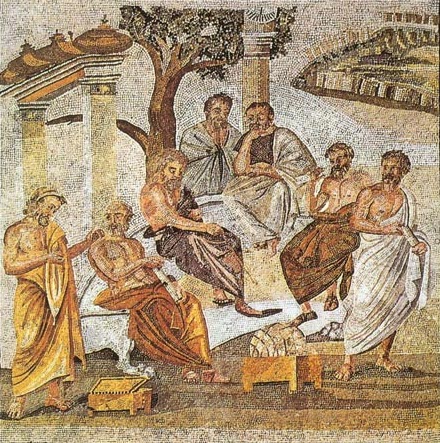 |
| The Academy of Plato-Mosaic Pompeii |
The Academy continued the Platonic tradition, giving weight to ideas and to ideatoys numbers more than in the real world. At The Same Time, philosophers of the Academy came time to return to the Socratic tradition, focusing their interests on ethics, but questioning even the possibility of true knowledge. To describe the evolution of academic thought, historians of philosophy stood out after the Old Academy (Plato), two more phases: the Middle and new Academy.
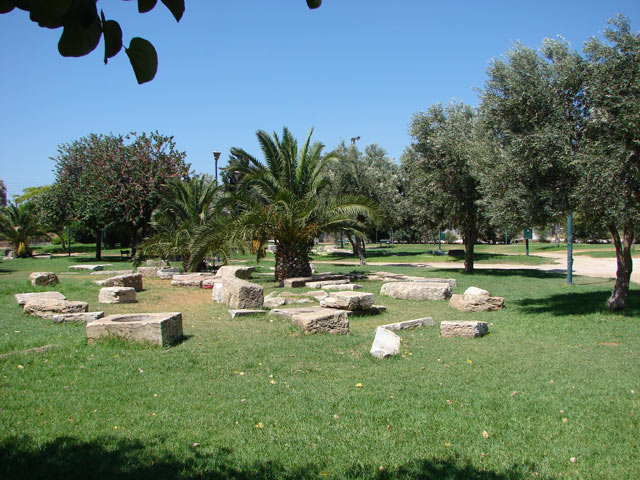 |
| The Academy of Plato in Athens |
Important after the Speysippo and the Xenokrati (s.. 172) the scholarch of the Academy (314-270 e.g.) stood the polemon, They argued that the behaviour of human virtue must be consistent with the nature. He wrote several, Diogenes Laërtius tells us,[The Diogenes Laërtius, author of the 3rd ad. century (s.. 275), wrote the Philosophers Bion and doctrines synagogue, that is our best source for life and theories of ancient philosophers.] but they stayed and jokes were lost with the destruction of the Academy.
Student of Polemwna, and successor at the Academy, the crates of Athens, that "left behind books (other philosophical, more on comedy, other with public speeches and ambassadorial) but and notable students, among them the Arkesilao ... " (Diogenes Laërtius 4.23).
The Arcesilaus from Asia minor Pitani (316-242 e.g.), disciple of the peripatetic Theophrastus and of Polemwna and of States, marked the shift from the Old to the Middle Academy. Specific, reacting to the dogmatism of Stoics, Arcesilaus returned to the swkratikoys dialektikoys ways: projected arguments supporting or negating any location without ends nowhere. Only correct attitude was in his opinion the epochi, like the edidaske Pyrrho (s.. 221), that is, the suspension of any final crisis – and this is not gi᾽ wrote nothing!
For the same reason, believing in the epochi, left no writings and the most important representative of the Middle Academy, the Karneadis of Cyrene (214-129 e.g.), more diligent man with important rhetorical skills, they dispatched to Rome[The 156 e.g.. the Athenians, to support their position in a dispute they had with the inhabitants of Oropos, sent to Rome instead of other representatives three philosophers: the academic Karneadi, the Stoic Diogenes and the trekking Kritolao. The three of them are impressed with the wisdom and eloquence the Romans so, so some conservative circles feared that would corrupt young and cared xaposteiloyn them the fastest.] He was speaking one day in favour of and the other against justice.
However, Although he believed that each fixed post is pointless, because there is no definite criterion of truth, again he taught that pondering the chances to avoid the big mistakes.
 |
| O carneades |
O carneades was an ancient Greek skeptic philosopher of the second century b.c.. He was born in year 214 ή 213 e.g.. in the Greek city of Cyrene in North Africa. Young still came to Athens and studied at the Academy of Plato, where he excelled and was assigned the boss. Main source CVS Karneadi information is the work of Diogenes Laertioy, Lives of the philosophers.[Lives and gnwmai of in filosofia eydokimisantwn, Book Iv].
The Karneadis was born in Cyrene Libya the 214 ή 213 e.g.. and soon came in Athens, where joined at the Academy. In Athens, He studied the Igisino of Pergamum who, then, was led by the Academy as Scholarch.[2] Grappled intensively with the teachings of the Stoics, especially with the work of the late major stwikoy philosopher Chrysippoy. He attended also courses on the dialectic of Diogenes Seleykio him (aka Diogenes the Babylonian) who was then the head of the Stoic school in Athens. At some point before 155 He was appointed, as successor to Igisinoy, the scholarch of the Academy of Plato. 155 e.g.. visited Rome as ambassadors of Athens he, the Critolaos of megalopolis the Peripatetic and stoic Diogenes Seleykios head. Cause was the negotiation of a fine 500 talents which had been imposed in the city of Athens for the destruction and looting of the city of Oropos. Messenger project was to achieve the elimination or at least reducing the penalty. There they introduced with lectures the philosophical ideas in the heart of Italy. The Karneadis in Rome gave two lectures on justice. At first the praised while the second socked. So won the admiration of the Roman youth with unsettled dialectic reasoning of. The result was a reduction of sentence in 100 talanta.
But the philosopher would also give lectures in the city and the public appearance of Karneadi attracted great attention. The Roman Senate with representatives of Cato the elder pushed for removal of the Rome, to avoid corrupting the youth.
The Karneadis in the lectures of proclaims the failure of metaphysics in General, Sears all philosophical doctrines & schools, denies the existence of natural law, considers inherently vague and undefined the meaning of Justice and, Therefore, the application of any legal system with this, While he believes in both senses awkwardness knowledge and logic.
According to the Karneadi, who further systematizing the teachings of Arkesilaoy of Pitinaioy, the absolute knowledge is a illusion while humans do not possess, Neither can hold, no criterion of truth, and therefore we cannot ever be truly sure of anything, only prisoners pithanokratikwn gnwsiologikwn possible.
Finding the most eylogofanwn of these possibilities is a thorny path that meanders between the ultimate question and the dicey dogmatism. With the Karneadi the Academy of Plato went into a new phase syntonoy skepticism that rejects any dogma and instrument approach of absolute truth.
Left no writings and many of his views are known only through his successor at the Academy (127/126 e.g.) Kleitomachoy. The Karneadis died of old age in Athens, the year 129 ή 128 e.g..
|
From the site of the Lyceum in Athens
|
The shift to the new Academy occurred after the destruction of the school, the library and the file by Sylla (84 e.g.), When head was Antiochus from Ashkelon of Syria (PR. Seleucid Kingdom). As philosopher Antiochus can and should be called selective, as his teaching was based on themes where academics, the ambulatory and the Stoic philosophers generally agree.
The eclecticism of the broadcast and the most famous disciple of, the Cicero, He attended his lessons when he visited Athens, the 77 e.g..
From the works of Plato's successors above are saved only limited excerpts and information.
The School continued its peripatetic philosopher's tradition of its founder, the empiricism and the cultivation of individual Sciences. Even though the academic work continued for centuries in this real pan-epistimio, the philosopher Aristotle's theory was neglected and the books of, with the exception of some external dialogues, lived unknown.
Station and renewal of its ambulatory continuation of philosophy was, the 1st b.c.. century, the discovery and publication of the works of Aristotle by the then head of Lyceum, the Andronicus of Rhodes (s.. 276).
Disciple of Aristotle Evdemos (42nd/3rd BC. αι.) turned, After the death of his teacher, Home Rhodos, where he founded his own school. As Theophrastus (s.. 176), the Evdemos stayed loyal to the Aristotelian teaching. Of the many sensible, Math, Astronomical etc.. best-known projects is the natural, where with a few variations and clarify the reference made Aristotle's work.
Disciple of Aristotle was Demetrios Falireas (42nd/3rd BC. αι.), orator, politician and legislator, that as a representative of Kassandrou ruled Athens for ten years and wanted, as a point and succeeded, to impose to the Athenians the ambulatory moral and political authorities. Respectively, in a large number of his works were dissertations Of laws, Of the Decade, Of demagogy, Of ritorikis etc etc.
The Straton of Sardis by the Lampsako was for many years a teacher of Ptolemy II before his successor Theophrastus at high school (287 e.g.). Of the many and varied projects that delivered that wrote most known were the theses on subjects like Cosmology and physics, Perhaps because they did not hesitate to disagree with Aristotle.
The Fasili Critolaos of megalopolis from Asia minor was Director of the Lyceum by the 180 as the 170 e.g.. Remarkable was his tendency to underestimate the political orators and General rhetorical, I saw "more botch job despite art». Value were gi᾽ him philosophers theorists as masters every virtue.
From the works of Theophrastus after hiking the Hellenistic philosophers survive not only limited excerpts and information.
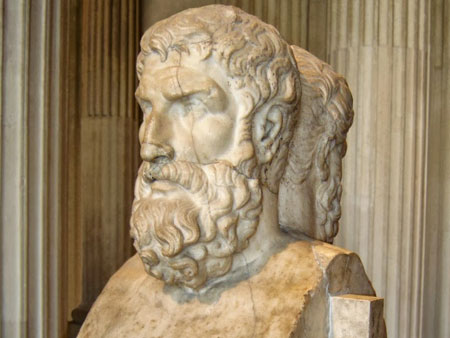 |
| Epicurus |
ASSISTANT (341-271 e.g.)[More about the Adjunct and philosophy see. (C). Zographidis and b. Kalfas, Ancient Greek philosophers, ch. 10.]
Biwsas Lathe.[«Live quietly (away from politics), you don't understand. "]
Born in Samos by Athenian parents, but later moved with his family to the Colophon. [The Colophon was an ancient city of Ionia, built near the coast of Asia minor, between Lebedo and Efeso] According to tradition he studied in Naysifani, follower of Democritus, and on Pamfilo, follower of Plato.
Young lived in Mytilene and Lampsako, where he founded and its first school. Thirty-five years old he went to Athens, bought a House with a garden at the periphery of the city and first set up the school of, the garden, more a friendly community where everyone could come to symfilosofisei rather than the usual school concept.
His teaching has had success, Why respond to needs of the people of the time and because he with his personality and his lifestyle was a living example atarachoy and happy man: witnesses ' gratitude to his parents, the support to the brothers of, the kindness of the minions […], generally benevolent attitude towards all. Are not described with the words eysebeia to the gods and the country " (Diogenes Laërtius 10.10).
THE Assistant He believed that the purpose of philosophy is not to provide knowledge and skills, but to make people happy. So his attitude was negative towards rhetoric, the logic, math and other mental fields, as more valuable than the mind had, believed, the sensations. Positive concepts in teaching was self-sufficiency, offering freedom, the friendship, that contribute to security, wisdom, mental equanimity, more ap᾽ all the pleasure, Unlike the pain, the fear, regret and deprivation.
Pleasure Epicurus saw syddeti with human nature and not stood out by virtue. Characteristic and the teaching of the death, you do not need, said, at all to the fear, because "as we exist we don't present the death, and when death is present, does not exist we» (Diogenes Laërtius 10.125).
The writings of Epicurus was huge: over 40 theses, among them one Of Nature in 37 books. Our hands reached ((a)) the project LINKS: Kyriai doxai, where were recorded for didactic use, well formulated in simple reason, some basic posts,[A newer gnwmologio of Epicurus survives in the Vatican Library.] ((b)) the testament of, and ((c)) three letters – important, as one exposes condensed his views on Physics, in other celestial phenomena, and in the third for the moral.
Information about teaching and excerpts from the works of Epicurus rescue us crowd yet sources, e.g.. the karboyniasmenoi papyri of the Villa of Piswna in Heraklion, near Pompei, which when read reveal fragments of the writings of Filodimoy.[The Philodemus of Gadara of Syria (CA. 110-40 e.g.), philosopher and poet, He lived for a time in Naples, southern Italy, where the teaching, the acquaintances and many of the writings helped to spread the philosophy of Epicurus.]
Successors of Epicurus There have been many, the school was kept alive as the 1st b.c.. century, and his teaching much more. Particularly important was the spread of epicurean philosophy in Rome, where among the friends and fans of included figures such as Horace, the Seneca, Lucretius on ap᾽ all, that his work "nature of things" (De rerum natura) is a comprehensive report of physical theory of Epicurus.
Competitive, Yes and hostile, in the garden stood the second philosophical school founded and flourished in the Hellenistic years, the Arcade. The extremely long duration and the change of leading historians of philosophy to distinguish, as in the case of the Academy, three phases: the Ancient and the Middle Arcade in the Hellenistic period, and the New Arcade in Roman times.[More about the philosophy of the lodge in the book of (c). Zwgrafidi and b. Kalfa, Ancient Greek philosophers, ch. 11.]
 |
| Zeno Kitieys |
ZENON (332-261 e.g.)
Born in Kition in Cyprus, but the descent was from (the PR. Seleucid Kingdom) in Phoenicia. Twenty year old found in Athens, where for ten years in the States mathitepse cynical, in Stilpwna the megarian (s.. 168) and in the Polemwna of the Academy (s.. 214). In his thirties he began giving himself lessons in Varied lodge,[Varied (colorful) It was called one of the arcades of the Athenian market, because the number of murals adorned, among them the famous "iliupersis" polygnotos.] ap᾽ where she was named the school of. His teaching was from the outset a great success and brought together many important students.
The Athenians have made Lomé as lived, and when he died the relinquished, Although it was a stranger(not an Athenian citizen) , public grave in Keramikos – to know all, wrote the resolution, that • dimos Ἀthinaiwn τῶν ἀgathoys zwntas toys and tima and teleytisantas (Diogenes Laërtius 7.12). The philosophy had been intense effects, but this has not prevented it to be significantly different from both the classic systems of Plato and Aristotle and the modern teachings of Epicurus and considerations.
His was the Division of philosophy into ((a)) Logic, with content the epistemology, grammar, the rhetoric and logic, ((b)) Natural, Ontology content, Cosmology, Psychology and theology, and ((c)) Moral, where was giving and the greater weight. The aim of philosophy was (What else;) the Bliss, with a prerequisite the virtue.
An opinion of how his thinking has been with the trends of the season: "Not live apart in cities and organized into townships, having defined our own each place fairly, but all people to consider syndimotes and fellow; one is the way of life and one class, like a flock that symboskei and syntrefetai under the same regulation as a whole. "[Mi against cities mide oIkwmen Idiois ekastoi diwrismenois municipalities dikaiois, but all ἀnthrwpoys igwmetha dimotas and εἷς life politas; he ż and world, wsper ἀgelis nomw koinw syntrefomenis such (aposp. 262 = Plutarch, Ethical 329a-b).]
In writing of the project included, Apart from the philosophical theses Of against nature of life, Of pathwn etc., and literary works: Of words, Of poiitikis ἀkroasews and five books Omirikwn problems – all, Apart from little snippets, lost.
The Zeno succeeded in Arcade kleanthis from Ace of Trwadas (330-232 e.g.). In Athens had come as poor Boxer, but enthused with the teachings of Zeno so that night to work in the orchards and the day studying. As head of the school of efilosofise gennaiotata: He remained faithful to his master's theories, He wrote numerous books to support and supplement, developed the Stoic theology and composed a technically and philosophically meaningful Hymn to Zeus, We saved. However, in the years of the stoical philosophy was challenged from many sides and the school may have been dissolved, unless the next scholarch of chanced, Chrysippus, be both dynamic and worthy.
 |
| Chrysippus the philosopher Chrysippus, son of Fast from the Hock, He was one of the most important of the Stoic school, alleged one of the founders of. He was born in Soloys or in Tarsus of Cilicia |
ChRYSIPPOS (CA. 280-205 e.g.)
EI mi gar in Chrysippus, oyk if in Arcade.["If there was no Chrysippus, There would be neither the lodge. "]
Diogenes Laërtius 7.183
Descended from the Soloys of Cilicia. Young came to Athens and initially studied at the Academy. Later joined the stwikismo and became, in troubled times, able and Savior of head Lodge. "Intelligent man and Curt […] tsakwthike with Zeno, but with Kleanthi. The latter often said that reaches to taught the doctrines; evidence will find alone» (Diogenes Laërtius 7.179).
Really, the dialectic comfort that had apochtisei in kgfai the syllogistikes Academy of skills helped him first to systemize the Stoic teaching and support on solid rational bases.
The tradition of returns over 700 theses, covering almost all fields of philosophy. So, No wonder when we learn that his books were highly casually, full replays, procrastination and quotations from other authors.
The shift toward the middle of the ancient Lodge took place with the Panaitio from Rhodes (CA. 185-109 e.g.). Before joining the Lodge, He had the mathitepsei States Panaitios, the worthy philologist of Pergamon (s.. 227). Lived in Rhodes, where was a priest of Poseidon, in Rome, where syntrofepse with the Scipio Emilianos, and in Athens, where the last twenty years of his life as head of Lodge attracted and taught numerous notable students. The philosophy of, less rigorous than its predecessors, accepted some of the suggestions of the Academy and of the promenade; and on ethics teaching was tailored to the ideals of (Romans) political and military leaders. The writings of Panaitioy have been lost; but Cicero's De officiis follows in many of his own making On thesis of duty.
POSEIDWNIOS (CA. 135-50 e.g.)
Posidonius of Apamea the ,Syria (PR. Seleucid Kingdom), He was disciple of Panaitioy. For many years he traveled in Italy, Sicily, Sardinia, the Spain, the Portugal, the Gaul and North Africa, until finally settled and taught in Rhodes, where watched for a bit of homework and recognized the value of first by Cicero (77 e.g.), later and Pompey (66 and 62 e.g.).[Feature that, When he wrote a separate Around Istorian Pompiion, Cicero sent him and a report of his own personal action; but hope to honor him and that the philosopher with a work is faltering.]
The interesting, respectively and writings, the Poseidwnioy were not limited to ethics, the logic and other philosophical fields itself, but expanded and in theology, Cosmology, Astronomy, the fysiognwsia, Geography, the Ethnography and history. In the latter field he decided to continue the work of Polybius history (s.. 207) and wrote the Meta Polybion Istoriin in 56 books, covering the years from the 146 as the 88 e.g..
The breadth of interests and the anthropological erudition of Poseidwnioy helped him to develop a philosophical system of universal, fitting with the historic image of the era, where the Roman Empire possessed and fix everything. Single and tachtiko the universe of Poseidwnioy included the gods, people and the natural world, all in harmonious coexistence and cooperation, tied with what the Stoics called sympatheian.
Of the numerous works of Poseidwnioy not saved any. Only information we, Some quotations and references, showing his great influence on subsequent thinkers, Greeks and Romans.
The works of Poseidwnioy was not the only lost. Apart from the hymn to Zeus of Kleanthis, from the rich production of ancient and Middle Lodge any work we have saved. Strange, because indirect reports and information indicate that the Stoic teaching had great resonance in thinking not only of the Hellenistic age and the ages that followed.
The third philosophical direction developed in alexandrina years, the Skepsis, no organized in school with the literal meaning, but based on the oral teaching of Pyrrwna, built and was completed by his students.
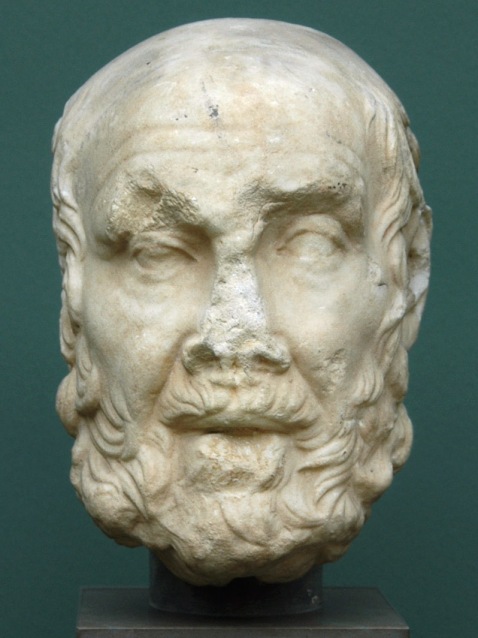 |
| The Pyrrho ileios was a Greek philosopher, founder of the school of skepticism |
PYRRWN (CA. 360-270 e.g.)
Panti logw reason ἀntikeitai.["Every reason has (equivalent.) independent minds ".]
Diogenes Laërtius 9.74
Born in Elis and upon delivery since the Megalexandro in his campaign as the Indies, where he met Gymnosofistwn and philosophy of the Magi. Certain is only that for many years he lived poor and honored in his homeland as a freelance teacher of philosophy.
The Pyrrho did not leave behind any textbook – naturally, We would say, having believed that there are no objective criteria of truth, that nothing is certain and that each reason applies just as well as the antithetos of, IE at all. All you can and must do is to think (i.e. to observe) the phenomena, remaining indifferent, unruffled and therefore happy.
Forerunners of skepticism[Skepticism is called in history of philosophy Pyrrwna theory and Skeptical (philosophers) the followers of. However, in modern language, the term is used more generally with skepticism the importance of ' doubt,' defiance ', even the "distrust" against every claim; and those who adhere to this position are called "skeptics".] can be considered everyone who occasionally questioned whether the very existence of truth or the ability of people to fix it, but the absolute epochi, i.e. the refusal of the wise to express any judgment, should be attributed to the teachings of Pyrrwna, where ap᾽ and adopted the Arcesilaus and the Karneadis of the Middle Academy (s.. 214).

The teaching of Pyrrwna solidified and recorded much later, the 1st b.c.. century, from the Cretan Ainesidimo who taught philosophy in Alexandria. The Pyrrwneiwn reasons oktw books I wrote were for the most part lost, but their content is pretty much known by other authors, modern as Cicero, or downstream such as Sextus the empirical (s.. 281).
In the chapter of alexandrine philosophy included three more authors, they preferred to filosofisoyn with satirical mood, and in verse:
The Timon of flious (CA. 320-230 e.g.) He was disciple of Pyrrwna. He wrote numerous works, prose and poetry, among them silloys satirists, where diakwmwdoyse the various philosophical systems and their representatives.
The Radius of the Megalopolis (CA. 290-220 e.g.), politician, legislator and cynical admirer of Diogenes, ithikoplastikoys Meliamboys wrote in Doric dialect, where love compliment when it comes good, but he blamed the wealth and the gods that don't divide properly.
A contemporary of Grandstand and disciple of shameless was the Menippus of Gadara of Syria, which in turn parodied the philosophical systems and philosophers. His works, where the nonfiction dianthizotan with lyrics, have lost, but the unmistakable effect at katopinoys Greeks and Romans satirical authors allows us to guess at the accuracy and their eyrimatikotita.
Greco-Roman era (31 BC-330 ad.)
The 30 e.g., with the incorporation of Egypt in their territory, the Romans essentially completed their possessive dash in East and West. With the exception of some regional areas, that and they don't take long to conquer, all the known world had in one way or another accepted Roman sovereignty.
Contemporary with the incorporation of Egypt, and important as historical fact, was the conversion of the peculiar Roman Republic in AutoCAD, with First Emperor Augustus, He ruled successfully from 29 e.g.. as the 14 a.d. – forty-three years. Followed in unbroken order more than fifty emperors, other good, other baddies, until at 11 May 330 a.d. Constantine the great inaugurated as capital of the Roman Empire the New Rome, later renamed Constantinople.
Terrible in war, the Romans were in peacetime symbibastikoi, almost high-minded towards the conquered, and often leave them, at least seemingly, to kybernioyntai with their own laws[Already the 194 e.g.. the Roman Governor Titus Kointios Flamininos, After winning in the second Macedonian war, had declared that leaves eleytheroys and ἀfroyroys and ἀforologitoys, chrwmenois tois patriois nomois, Corinthians, Fwkeis, Locri in, Eyboeas etc.. (Plutarch, Titus 10) – but the reality proved different. The same proclaimed the 66 a.d. and Nero for all Greeks, but a few years later the decision was cancelled by the Bespasiano.] – arrives not absorbed Roman interests and peithontan at Emperor's cheques, of the Senate and appointed their representatives.[Plutarch advised anyone who planned to deal with the policy says to himself: "Kyberniesai myself, and govern city subservient to anthypatoys, the Commissioners of the Emperor» (Politika commands 17).] Beneficial for vassals, individuals and States, was the exemption from taxation, While the highest reward for those who have shown practical commitment in Rome was to be awarded the title, and to recognize the rights of Roman citizens. The latter became more and more frequently as the years progressed, until the 212 a.d. be named, by edict of Caracalla, Roman citizens all free inhabitants of the Empire.
The relative leniency of the Romans no prevent the conquered areas to suffer badly from the conquerors, that whole isopedwnan States, katalisteyan artistic and other treasures and exploited their economic potential. Poor return on so many sufferings was for Greek regions respect and favor that showed some emperors towards Athens, Ephesus, Delphi, elefsis and other religious and cultural centers.
Remarkable strength outside of Rome did not exist in Greco-roman time, nor could thrive, as the Rome imposed by its size and only. And of course completely never stopped military operations in the region, Neither the internal conflicts, When the succession of emperors do not evolve smoothly, but uprisings were minimal and generally the Roman peace lasted centuries.
The overall political situation we can understand better by reading a sentence you wrote about mid 1st century. a.d. one for our anonymous author: "As maintaining the memory of freedom and employs the ypodoylo, the people want and shows strong resistance; but when evil prevails and people are not talking anymore how I make over them but how to live more easily with him, then the destruction is complete» (The chians, Letter 14.2). Don't forget, However, that already from the time of Stretched the peoples lived in large box monokratoriwn, and that the Roman domination, as unpleasant and if it was, constituted a guarantee of peace, law and order.
Athens has continued and in Greco-Roman years is a center of philosophical studies and its role strengthened, When the 176 a.d. the Emperor and philosopher Marcus Aurelius (s.. 280) He set up in Athens four philosophical seats, than one for Academy, the walk, the Arcade and epikoyreioys – not for skeptics, who doubted everything.
The various philosophical schools or directions continued, with their representatives to teach, to interpret, to complement and promote the thinking of the founder of the school and their successors. However, Since the last Hellenistic philosophers were beginning to lay aside their differences and to converge, phenomenon that now, in Greco-roman times, universally: followers of a school does not have hesitated to adopt ideas from other directions, and the philosophical thought tended to integrate in a single system, eclectic.
Don't forget that in Greco-Roman years next to philosophy was developing a new religion, Christianity, the apocalyptic teachings of not only solve ethical problems and dictate a virtuous lifestyle, but it still fell short of the metaphysical needs of believers and xanoige prospects for a better afterlife in the afterlife.
Compelled to compete, natural philosophy was to give this emphasis on the transcendental and mystical of faces. So, for a time blossomed again pythagorismos;, in the philosophical field dominated the Neoplatonism, they had assimilated crowd figures from other schools and was intensely metaphysical and mystical tendencies.
THE EDITION OF THE WORKS OF ARISTOTLE (30 e.g.)
Station on the threshold of the Greco-Roman era was the publication of the works of Aristotle by Andronicus (s.. 174 NB. 156). As was only natural, the version, where for the first time the Aristotelian philosophy presented in full and as integrated system (that wasn't, s.. 175), gave the high school new life – and employment.
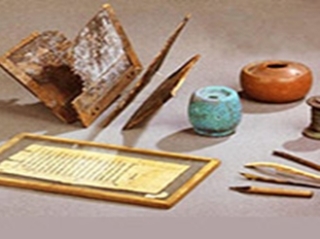 The aristotelikes treatises were concise and obscure as to content and language. So, in the decades that followed the version, a whole range of set-up philosophers studied the study, comment, to erminepsoyn and parafrasoyn the aristotelika projects, without their care would continue to remain unknown.
The aristotelikes treatises were concise and obscure as to content and language. So, in the decades that followed the version, a whole range of set-up philosophers studied the study, comment, to erminepsoyn and parafrasoyn the aristotelika projects, without their care would continue to remain unknown.
First Andronicos himself from Rhodes introduced in version one's own introduction and added the biography of Aristotle, a list of his works and some reviews. Followed the student of Hotepsekhemwy from Sidon, He commented on the Course, classes and Ἀnalytika formerly, the Xenarchos from Seleucia, Although peripatetic challenged basic aristotelikes posts, Nicholas of Damascus, We met him and as a historical (s.. 264) etc.. Their common trait is the tendency to introduce in Aristotelian philosophy, as interpreted, figures from academic and stoic theory.
Important cultural centre was from the Hellenistic period, and maintained in the Greco-roman era, and Alexandria. Εκεί, where the Jewish community was, We remind, the biggest after the Greek, held, end of 1st BC. and early 1st ad. century, a significant, prochristianiki, approach Judaism with Greek philosophy.
(P. ARChAIOGN/or Alexandria was ellinikotati and the guard of the Roman legion composed owned by Greek soldiers ,as with the legions in the East Mediterranean and was not simply a large Greek community )
FRIENDS OF THE IOYDAIOS (1ND BC/1st ad. αι.)
Born in Alexandria from family who were financially independent, politically strong and linguistically hellenized, so the Friends do not know even the Hebrew and he is the theological and philosophical works in Koine Greek. All that we know about his life is that he visited Jerusalem and Rome, where the 40 a.d. defended as diplomatic dispatched the interests of the Jews of Alexandria.
The starting point has always been the old testament, like the knew from the Septuagint, and the attachment to the Jewish spiritual tradition it stood steadfast. However, He gave two of his works, in Ἀlexandron and in the welfare Of, the characteristics of Platonic interactive format and do not hesitate, interpreting the Judaic holy texts, to use Greek approaches, as in Laws Ierwn ἀlligoriai, and to adopt Greek, stwikes or other ideas, as on Of the spoydaion is always eleytheron.
Of the numerous works of, other, as the life Of Moses, survived intact; other, as some legends in the Pentateuch, in Armenian translation; other, as the Ἀpologia in favour Ioydaiwn, We are known only from fragments in their books parathesan younger Christian writers.
 |
| The Apollonius neopythagoreios Tyaneas was a Greek philosopher from Tyana of the Roman province of Cappadocia in Asia minor |
APOLLWNIOS THE TYANEYS
Apollonius of Tyana of Cilicia (1nd a.d. αι.) ap᾽ edge s᾽ edge travelled the Empire by unleashing the Pythagorean way of life: piety, prayer, the frugality, vegetarianism, sexual Continence k. t.. He did not have reason to believe that he was a crook, as the featured, always kakoglwssos, Lucian. But had not the supernatural gifts who would the followers of, When you argue that could talk to the animals, reject the gremlins, to resurrect dead and, prisoner, to solve the shackles of. His reputation was left alive and the 2nd a.d.. century the Empress Julia Domna commissioned in Flavio Filostrato to write Home in the Tyanea Ἀpollwnion (s.. 261), curriculum project where the historical data it was natural to have subsided ahead of the dominant legend.
From his own works the Teleytai or of thysiwn and Of pythagorikou of life is lost. But were 77 letters, among them some that may well have written it himself.
Apollonius was not the only one who preached with success the Pythagorean philosophy.
The mystical-religious dimensions of teaching of Pythagoras was to resonate in a society he sought metaphysical props. So, No wonder when in Greco-Roman years widely circulated, unknown when and by whom written, the epi Chrysa (quotations) of Pythagoras, or when some (neo)pythagoreanism,[Is it coincidence when the three greatest, the Moderatos of Gadara (1nd a.d. αι.), the Nicomachus of Jerash (11st/2nd a.d. αι.) and the Noyminios of the Apamea (2nd a.d. αι.), all came from Syria;] combining in their works the Pythagorean with platonic theory, paved roads to the neoplatwnismo.
The stoical philosophy represented the 1st a.d. century with a group of philosophers, all of whom, in one way or another, initiated in the fields of allegory. The Kornoytos from the Libyan Lepti interpreted the Greek theological system Jupiter by equating with the soul, IRA with air, Athena with wisdom etc. · the misnomer Kevitos Theban Table, certainly does not belong in Kebi socraticus (s.. 167) but in an about us anonymous philosopher who wanted, interpreting a patently fantastic, allegorical picture, recommend the Stoic road to bliss, where no one arrives with the pseydopaideian of music, the numeric, rhetoric, etc., but only with Temperance, the fortitude and the other moral virtues; in our hands arrived and Omirikai ἀlligoriai of Heraclitus from Pontos (;), where e.g.. It is argued that the arrows of Apollo at the beginning of the Iliad is not from the rays of the Sun, that cause epidemics and drought.
ALSO
Apollonius, as a representative of the Pythagorean, trying to give content to the pneymatikotero corrupt polytheia era. And I do not understand some polytheists of today. Consider the mythology "work of poets" and abhorred the noticeable expression of divinity, but the powerful love of freedom was an innate tendency toward magic, the prophecy and thaymatoyrgia, the same – if you want- people of that era.
Apollonius Tyaneys had imposed a correct lifestyle: After a five-year silence imposed on himself, He began a series of tours, in conjunction with ascetic life, preaching abstinence from the bloody sacrifices, wine, bathrooms and erotic Orgies. Went to Ephesus, Pergamum, Troy, Lesvos, Evia, Piraeus (60 a.d. in celebration of the eleusinian), in Athens, at Thermopylae (where he met the Amfiktiones). Also visited the temples of Apollo Delphi Abwn, the divination Dodonis and Trofoniou, the Holy Amfiaraou and Muses, Olympia, Sparta, Crete, Rome and Spain.
Then the Apollonian Tyaneys returned again in Greece (the 68 a.d.), where he was initiated into the eleusinian mysteries. Went on Chios, Rhodes, Egypt, where he became acquainted with the Roman Emperor Bespasiano, but she complained to him about the Roman annexation of Achaea. After he fled to Cilicia, When he met the son of the Emperor Titus, and he continued his journey towards Syria and Phoenicia.
And here is worth to say something important: The vileness of the emperor Domitian and his marriage to the beautiful niece of Julia aroused the indignation of Apollonius, I didn't hesitate to go to Rome to denounce. WHAT,what IE did a contemporary of, I was listening to the name John the Baptist, When denounced the Herod, who did similar things with Irwdiada and her daughter Salome (Gospel of mark, Parlay Vi).
In the trial, that followed his arrest Fast of Mystic Apollonius Tyaneus, He attended the emperor Domitian, but that stopped the trial and left the katigoro to flee from Rome.
 |
| This interesting oil painting 1874 is the work of N. B. Starr and depicts Apollonius. |
The 93 e.g.. Apollonius attended at the Olympics, went to the Oracle of Trofoniou, He stayed two years in Achaia and the 95 He returned to Ephesus. The was the murder of Domitian and the rise of the Roman throne of his friend and philhellene Neroya.
It is a fact, that Apollonius died in deep giratia on Trajan, around 100 a.d. and efimizeto that all tours of giatreye sick, He turned away the wicked demons, did fortune telling, prophecies and that said did even "resurrections it is too much dead"..
Can, of course his salvation from the Roman court considered miracle, and the vision that saw the moment of the murder of Domitian and all that, in conjunction with the virtuous life, they had like result be honored posthumously as a hero or God even. Though, as we read, the neoplatonist philosopher Hierocles of Alexandria (5century a.d.) disciple of Plutarch, the featured more important than Jesus, causing the war of ecclesiastical history Eysebioy.
Apollonius, as a representative of the Pythagorean, trying to give content to the pneymatikotero corrupt polytheia era. And I do not understand some polytheists of today. Consider the mythology "work of poets" and abhorred the noticeable expression of divinity, but the powerful love of freedom was an innate tendency toward magic, the prophecy and thaymatoyrgia, the same – if you want- people of that era.
The life of the Mystic Apollonius Tyaneus Fast with many fantastic additions described by Moirageni and from the Filostrato, in order of Julia Domna, wife of Septimius Severus and mother of Caracalla and Geta. Apollonius (as a historical person) left behind some projects: Teletai or on sacrifices (quotations in Eysebio) and a bion Pythagoroy, that in turn has been a source for the biography of Pythagoras by Iamblichus wrote halkida (There quotes)· from the 77 Letters that saved us, could, However, Some are genuine. ANGELOS SAKKETOS
EPIKTITOS IEROPOLITIS (CA. 50-138 a.d.)
Born a slave at Hierapolis of Phrygia, but had the good fortune to serve in Rome an extremely rich and educated apeleythero, the Epafrodito, that gave comfort to mathitepsei in stoic philosopher Moyswnio Ruffo[ We are known a whole line of Stoics and philosophers who taught with success in Rome: ARIUS Didymus, friend of Augustus, the Chaeremon, teacher of Nero, etc.. The stoical philosophy from the outset had great resonance in Roman spiritual cycles, where those years the represented the famous politician, poet and philosopher Lucius Annaeus Seneca (4 b.c.-65 a.d.).] and later released him. Teaching anymore myself, the Acquired stayed in Rome as the year that the Domitian banished all philosophers (89 a.d.). Persecuted from Italy, He settled in Nicopolis of Epirus, where he continued to teach with great success until his death.
He did not write anything; but the student had known us historic Flavio Arriano (s.. 266), We diligently record verbatim, in the common, as were, his lessons (Of ἀtaraxias, How ferein dei tas diseases, Respect epikoyreioys and ἀkadimaϊkoys etc.), and published with the title Diatribai. Of the eight books of Diatribwn have saved the four, and a separate book, the Egcheiridion, where again Arrian had summarized the moral teaching of teacher. The philosophy of Epictetus was basically stoic, with elements of cynicism. Addressed to the average person, systinontas to fight his passions with the logikon and follow free reads command.
Has correctly observed that in Greco-Roman years the lodge had highlighted two extremely important philosophers: a slave, the Acquired, and an emperor, Marco Ayrilio, and, as was only natural, each of them spoke with his own way: the Epictetus was addressed in many, with rational arguments; Marcus Aurelius himself, with aphorisms.
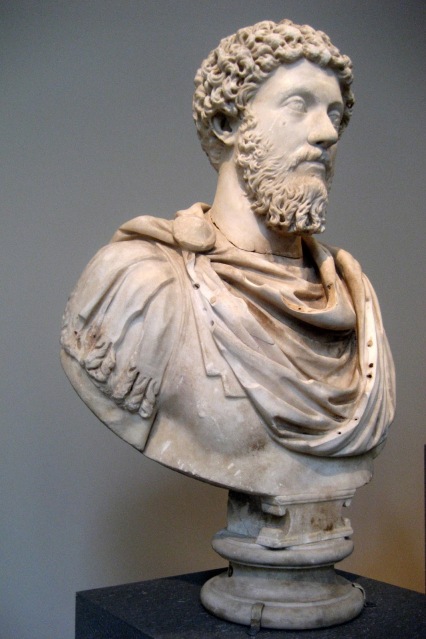 |
| MARKOS AYRILIOS |
MARKOS AYRILIOS (121-180 a.d.)
Endon skapte; the ἀgathou pigi of endon.[ "Inside (Sou) digging (to seek)· inside (Sou) is the source of the goods. "] Εἰς eayton 7.59
Marcus Aurelius had mathitepsei in the famous Roman orator and ritorodidaskalo Frontwna and Herod the Attic (s.. 257). Both the proorizan for orator, but eventually prevailed over its inclination towards philosophy. As emperor was unlucky: external enemies and internal rebels forced him to spend more than twenty years of power in warfare.
Εἰς eayton's work is a kind of diary where the philosopher-Emperor katagrafe with brief comments (e.g.. "those very ymnithikan already delivered to oblivion, and those who have long since disappeared moaning», 7.6), aforistikes crises (e.g.. • ἀdikwn eayton ἀdikei, eayton poiwn kakon, 9.4), Tips and categorical dictates to himself (e.g.. mi aIschynoy aided, 7.7).
Its philosophy derives a lot from Neptunium and Acquired and focuses on ethical behavior, recommending inner freedom from the passions, serenity, moderation, gentleness and tolerance – virtues that characterize and. Only Christians stood ategktos; perhaps because she saw how easily religion could them with moral teaching to substitute any practical philosophy.
As you would expect, the convergence of philosophical systems influenced the Academy, where philosophers – Eudoros (1ND BC/1st ad. αι.), Gaius (11st/2nd a.d. αι.), the Albinus (2nd a.d. αι.) etc.. – from the one adopted and incorporated in the Platonic theory pythagorikes, walking and stwikes ideas, of the other promoted to their posts the metaphysical and mystical elements of Platonism, preparing the conversion of the intensely theological neoplatwnismo. Last in series, the Celsus (2nd a.d. αι.) in his work Ἀlithis reason he put, make guesses because, with Christians.
SEXTOS THE EBEIRIKOS (2nd a.d. αι.)
Of his life we know only that he was a doctor, the empirical School of Irofiloy (s.. 230). But his works are preserved ((a)) Pyrrwneioi ypotypwseis, a summary of the views of Pyrrwna, founder of the school of considerations (s.. 221), and ((b)) Thoughtfully, consisting of five books Respect dogmatic, that is against all philosophers who believe in the rightness of their firm theory, and six books Respect mathematicians, that is against all of those who love learning, hold or teach a specific lesson: of grammatical, of ritorodidaskalwn, the astronomers, of natural, Mathematics with its current meaning, music etc.
 |
| Pyrrwneiees ypotypwseis-Alte Pinakothek- Munich |
In all these the Sextus manages, applying with a lot of skill the beginning of Pyrrwna that panti logw reason ἀntikeitai, to prove not only that what they think they know is wrong, but also that their every attempt to discover something true and right from the outset is futile.
Aptly observed that "klonizontas [with their arguments] cognitive features of rationality, representatives of skepticism helped, unintentionally, to pave the way for mysticism. " ((A). Words)
Around 200 a.d. a wealthy citizen at Oinoanda in Lycia, Diogenes, fanatic follower of the philosophy of Epicurus (s.. 216), established after his death to built a huge inscription (over 40 meters length!) "for the good of the city and foreigners who visit». The inscription, I found and posted by riven archaeologists, It contained four own writings, quotations and letters – all in the context of epicurean philosophy.
A contemporary of Diogenes it must have been the peripatetic Aristoklis from Messina, Sicily, author of a work On philosophy, ap᾽ where we saved quotes.
His disciple was Alexander from Aphrodisias in Cilicia (22nd/3rd a.d. αι.), holder of the Chair of the promenade which had founded the Marcus Aurelius in Athens. It was of course an exaggeration, When the Byzantines called it Ἀristoteli the second; but when the feature kat᾽ exigitin exochin: the interpretive memo (in Metaphysics, in Detail, The Weather etc.) characterized by strict method and rare discernment.
The last philosophical movement of Greek Antiquity, the Neoplatonism, appeared and developed in the 3rd a.d. century. Typical was the continuation of the Platonism of the Academy, where they had in the meantime mastered crowd pythagorika, aristotelika, with resignation, etc.. items. Essentially however the Neoplatonism developed into a truly new movement: by ideokratia, with the devaluation of the sensible world view concepts such as the ultimate, mental catharsis k. t.. responded better than any other philosophical teachings on spiritual needs of the people of the late Greco-roman era that yearn for metaphysical redemption from the fact.
Pioneer of neoplatwnismoy is considered to be the Ammonius Saccas [The Saccas was given him because paranomi, poor in his youth, He carried bags for living.] by Alexandria (22nd/3rd a.d. αι.), born Christian but preferred to become a national and philosopher. The Ammonius left no written work and his teaching is unknown. But, as a teacher of platonic philosophy in Alexandria, major students, among them are the undeniable archigeti of neoplatwnismoy, Plotinus.
 |
| Flavius Philostratus |
FLABIOS FILOSTRATOS
Flavius Philostratus (160/170 – 244/249 a.d.) is, together with the Diwna the Chrysostomos, the main representative of the Second Sophistic. Although he calls himself an Athenian was born in Lemnos and lived at the end of the 2nd century. and in the first half of the 3rd century. a.d. He went to Athens to study and later settled in Rome, the era that reigned the Septimius Severus, where he gained the favor of the Emperor's wife and mother of Caracalla Julia Domna. After the 217, so they found a tragic end the Julia Domna and Caracalla, He returned to Athens (in other versions he went to Tyros, where the given political rights) to act as a teacher of Sophistic.[World Biographical Dictionary, Tom, 9II s. 298, ekdotiki Athinon 1988]
From the extant works of "body filostrateioy" attributed to Flavio Filostrato the following:
Lives of the Sophists in two books. In the first book listed twenty-six philosophers-sophists, with first the Protagoras and last Aeschines, While in the second thirty-three orators, from the authors of new direction as the same author.. Even in this book by Philostratus gave the name to this innovative movement: Second Sophists.
Heroic. Dialogue, that shows a lot of similarities in skopothesia and in character with the Bion Fast of Mystic Apollonius Tyaneus.
Gymnastic. It belongs to the tradition of protreptikwn reasons that gives reliable information for matches, kinds of sports and proponisews methods.
Nero. Dialogue, as reminded very Lucian, Annotator was attributed to him. In the work the philosopher Moysiwnos kataggelei the ybrin of tyrannoy.
Letters. Has saved collection of seventy-three letters, written in ornate style, of which most are sex toys. The 73rd has as addressed to Julia Domna and an apology and defense of Sophistic.
Images, in two books. It belongs to the tradition of rhetorical ' expressions ' artworks. Describes sixty-five paintings that in terms of style is the finest work of Filostratoy.[J.s. Filostratoy, ΤΌΜΟΙ 7 REF #. 307-312, Ed. Cactus]
Fast life of Mystic Apollonius Tyaneus. His reputation has mostly Philostratus in eight books which were: The Apollwnion the Tyanea.[Constantine Cavafy Sages de prosiontwn ] National to use it as a counterweight to the spectacular spread of Christianity altered the image of this historic person (Fast of Mystic Apollonius Tyaneus) adding narratives of Wonderland and presenting him as evil sorcerer in a way that caused the reaction of Lucian with Alexandron or Pseydomantin.[Lucian, Alexander or Pseydomantis]
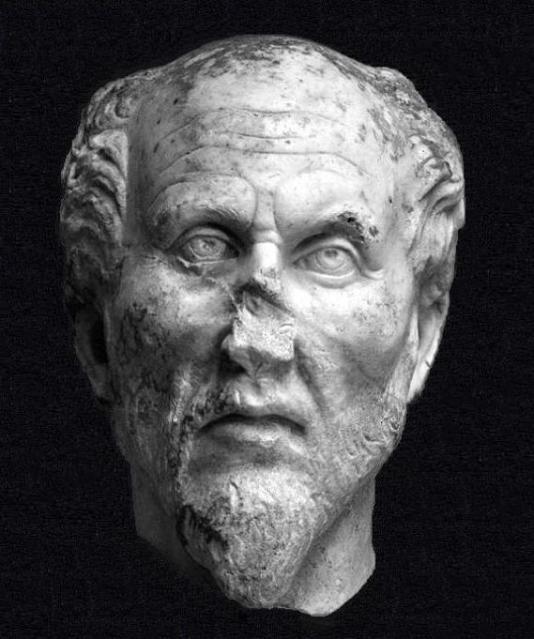 |
| Plotinus (considered to be the head ) It was an important philosopher of the late Antiquity and founder of the neoplatonic School of philosophy |
PLWTINOS (205-270 a.d.)
He was born in Lykopoli of Egypt and studied in Alexandria, where twenty-eight years old he met Ammonium Sakka, enthused with his teachings and stayed close to eleven years. Then, to meet the Persian and Indian philosophy, He followed the Emperor Gordiano III in his campaign in Mesopotamia; quickly though the Gordian was killed and Plotinus traveled, first in Antioch, then in Rome, where he settled and stayed in teaching over the last twenty-five years of his life.
The ascetic personality and teaching impressed the Romans; the reputation for wisdom and righteousness of spread, and there were few those who begged him to resolve their differences or manage as adoptive father fortunes had been orphaned children.
His students were many and worthy, but again not surprised to learn that attempted, but failed, to shape his teachings in standard socraticus dialogue, because discussions were complete ἀtaxias and chatter pollis (Life 3.37).
Following his teacher the ammonium and Socrates, Plotinus did not give importance to the written word. Slowly and with difficulty his students convinced him to write.
So, in the last years of his life, Plotinus record 54 funds from the philosophy of. The surrendered to his disciples, and from these the Porphyry (s.. 284) the tachtopoiise in six groups of nine funds, Depending on their theme, and the published entitled Enneades.
Plotinus wrote as if he was speaking: the language is mixed, the writing of abnormal, the style of atsalo and terminology are often invented by him; par᾽ all, Why has vibrancy and read delightfully, If it wasn't the meanings so complex and abstract.
Plotinus does not ever claimed that brought something new to philosophy. Instead, insisted on saying that another did not by interpreting its predecessors, Plato and Plato's. Properly; but new it was just the interpretation given to the Platonic theory, the composition of accumulated academic knowledge, the way that systematized the diffuse material – the consolidation of Platonism, as the projected mesmerizing his audience. Typical teaching of Platonic en, that not only corresponded with anymore the virtue and beauty, but it was the source of all beings.
With this almost deified, independent and absolute en Plotinus taught that people could, with exercise and a secret Rapture, unite – something that he, If you believe the Porfyrio, the managed four times.
From the disciples of Plotinus stood out ((a)) Eystochios doctor of Alexandria, who did the latest hours and had this issue, before the Porfyrio, the works of the master, and ((b)) the Amelios from Etruria, author of a series of remarkable philosophical writings but lost. Both the work was overshadowed by the editorial and interpretive prosperity of another student, of Porfyrioy.
PORFYRIOS (234-301/4 a.d.)
Porphyry was Syros from the Tyros. Mathitepse first in the Athenian Academy, then for five years in the school of Plotinus in Rome. Then settled for a time in Sicily; but turned to Rome after the death of his master to succeed in students.
Porphyry edited, as we have seen, the version of the Enneadwn Plotinus; but he wrote many. From the 65 projects that we know that he had authored and survived despite the nine, among them the precious life Of Plotinus and the class of this book, and another biography, the Pythagoroy life.
From the rest Of conditionality of ἐν Nymfwn τῶν ἄntroy Odysseia, where the well-known cave of Ithaca (n 102-12) interpreted allegorically as a symbol of the sensible world in ż ··· as Ierw psychai aI megistw diatriboysin (12), and Respect Markellan, his wife, Advisory Letter, where his, ἀlitheia, erws and elpis viewed as four stoicheia which help to approach the man God. From lost works let us remember only Against Christianwn, where the philosopher challenged the biblical Genesis, the enanthrwpisi of Christ and the second coming.
The Porfyrio occupied him more than any other man's attempt to secure the salvation of his soul, by overcoming the mind and the will and passions demons (!) They inhabit. However, his thinking was not particularly original; and he put more importance on correct understanding, commenting and spreading the philosophy of Plato, Aristotle and Plotinus, where the contribution of stood true important.
From the Platonism in neoplatwnismo, and by Plotinus in Porfyrio, the academic theory more and more away from the traditional philosophical reflections, increasingly sought and found answers to theological issues rather than philosophically. The same trend continued with the third important representative of neoplatwnismoy, Iamblichus.
IAMVLICHOS (CA. 250-325 a.d.)
The Iamblichus was Syros, as porphyry, He taught philosophy in Rome, but of course that didn't stop student and teacher to clash later in many. Deeply religious and mystical nature, the Iamblichus believed and that the existence of demons; while the Porphyry clutching distances from the divination, the magic and any attempt to influence of gods with arcane rituals and magganeies, the Iamblichus judged necessary for the philosopher to approach, with the intercession of demons, the divine knowledge.
As you would expect, the torque of mysticism and Theosophy led him to study in depth the pythagorismo and want to spread. By the complex task of Pythagorean doctrines Synagwgi saved the life Of the pythagorikou, the Reason protreptikos filosofian respect, the Theologoymena of ἀrithmitikis etc..
Yet, as genuine neoplatonist, the Iamblichus omitted not to comment on some works of Aristotle and of Plato, believing that the latter spoke with aInigmata (hints) and proposing new ways of interpretation.
Ta biographical information for Iamblichus, particularly for the years of his youth, are scarce. The offspring of the rich and aristocratic family, born around 250 m. X. in Chalkida of Hollow Syria. It is said that his family was descended from Kings priests of emesas (today's Homs), City famous for the Temple of the Sun God syrofoinikikoy Iliogabaloy. Proud of his national origin, refused to accept Greek or Latin name, According to the custom of the time, and kept the Syrian-mlikoy, "God rules". Originally studied the neoplatwnismo close to the trekking Anatolio, one of the first students of the Porfyrioy and then next to the Porfyrio, the leading disciple of Plotinus, probably in Rome, which succeeded to the position of Heir of the Neo-platonic School. Earlier, however, had founded his own school in Syria, where his fame attracted a crowd of students from the eastern provinces of the Roman Empire.
It is not known when or how exactly he died Iamblichus, probably around 330, shortly after the First Ecumenical Council and shortly before Christianity becomes the official religion of the Eastern Roman Empire. From the numerous students of the the Apameys and Sopater Aedesius, who succeeded at the Syrian School, and his disciple Aidesioy, Maximus of Ephesus, teacher of Emperor Julian. The most conspicuous but holdover of Iamblichoy is the Proclus, Successor of the Athenian School. Deeply influenced by the teachings of Iamblichoy is and the works of so-called "pseudo-Dionysios" exerted great influence on medieval Christian thought.
From the "Chaldean Theology» of Iamblichoy rescued six books: The life of Pythagoras, The Hortatory in Philosophy, On the common mathematical, On Nikomachou Numerical Gerasinoy Introduction, The Theologoymena of arithmetic and On the Egyptian Mysteries. Also, extensive excerpts from the "soul", from the letters to Makedonio and Swpatro "On Eimarmenis" and Dexippo and Swpatro "On Dialectic", they are saved in the "Anthology" of Stobaioy.
The approach of philosophy with religion expresses a movement, the Hermeticism, that gi᾽ him wondering if was philosophical system with religious overtones or, more correctly, ecstatic (monotheistic!) religion on philosophical grounds. Being placed in alexandrina years, the edge of the Greco-roman era. In Greek literature is represented by Ermin trismegiston,[Ermis trismegistos was the Greek name for the Egyptian God Thoth] a body from a variety of reasons where inside them coexist compatible or contradictory evidence from many religions. First and most important reason for the Poimandris («poimin ἀndrwn»), where the namesake God-Nous reveals secret truths about the creation of the world.
SOURCES WITHOUT
World Biographical Dictionary, ekdotiki Athinon 1988
Diogenes Laërtius, Lives filosofw
Amphipolis.gr | The navel of the Earth
The space required as no one else at the thought of man

At the beginning of the amazing Gorge in Stone of Jordan stands opposite a short inscription and a design etched into the rock. It is a tribute of a Greek soldier, a reference to the "Hub of the Earth", Delphi, that the Greeks were taking with them where they were going. And I had with me an admirable indication, the essay by George Seferis for Delphi. When I opened the ' trials ', they opened immediately and my wings, and like the mythical Eagles left Zeus to fly from the two ends of the world, among the Fedriades Stones: «(…) The myth may mean that the dark forces is the leaven of light· that the more intense, the more deep is the light when the master. And ponders that if Delphi landscape vibrates from such internal fibrillation, is why there is no maybe corner on our land to fermentation so much of the boundary between forces and by the absolute light». Indeed,, the landscape of Delphi is one of the most shocking in the world. The many confess that they have experienced. Because the Delfoiden is only a Museum of ancient Greek art and history, It is not only an amazing landscape light radiating irritates the eyes. It is a landscape that speaks to the mind and the soul to great things, for the power of God of harmony, of light and divination, talking about big ideas, such as Amfiktionies. The General landscape of Delphi, the monuments, the Museum with the strict Charioteer, the sources, the stones, all these do not give just the impression of a great archaeological site, but a landscape that matters as the visitor and the attitude that keeps far.
Heavenly scenery and Delphi ideology
Going up the paving that stepped on so and so many people voting as pilgrims for thousands of years now, leave left the Treasure of Athens (It was built with the spoils of the victorious battle of Marathon in 490 e.g.)· and as we move towards the first clearing of landscape, where most visitors stop to be photographed in a akoympismenoi column. Then they are coming back to mind the words of the journalist and art critic of the British "Guardian" Jonathan Jones· one of the pilgrims who say:
"Delphi, in Greece, have a strong claim to be considered the most wonderful landscape on Earth. Re’ the last brief visit there I have inculcated in the mind as the archetype of all classical paintings of the landscape painting· the dreamy location that somehow the Turner, Claude and Poussin tried to reflect in their works. In my memory, the crystalline blue sky of Delphi illuminates the marbles and silvers the leaves of liodentrwn, making it to spinthiroboloyn more strongly than even the brightest Turner projects. The landscape that looks like it was born to heaven, is essential. The original colours and the perfect harmony of culture and nature the lift in the fictional world of the gods. Delphi Greek mythology becomes reality ".
And all climb to the Temple of Apollo, the columns whose – those who still remain standing across the stormy centuries – look like pawns on the chessboard of human thought. One could write "know thyself" (has self-awareness), another "Zero Agan» (don't do anything excessive), and another "Metron" track, others can be expressed using other quotes of ancient wisdom. The dimensions of the temple are impressive, but the weight of. The xaplwmenes on Earth ancient stones rescue a slow music experience. The first contact of people become with mother earth through the fumes of some underground water current that went out on the surface by a crack of land. People came to rest their head on Earth, was getting to sleep and the great mother talked them into their dreams: "First I praise than’ the gods in my deisi/prwtomantissa Earth· (…)"says Aeschylus at «Eymenides».
But although the bouts of land is imposing, the light is pantocrator. So was the God of light and harmony Apollo, dominant here. Killed the Python, the son of the great mother, and he was installed over the sacred earth crack, to disclose that the coming events to mortals through Pythias and priests of.
So the whole story of Greece passed from here, from the tripods, next to crack that sat the Pythia sucking Bay leaves, and by the priest who was recording the inarticulate cries of to translate together with other priests in Oracle. From the place we would elect people of the archaic era to erect their colony in foreign land, until the major events of the classical era and the years of the great Macedonian Kings.
All political developments, the historical episodes, the ideology of Greece, were reflected there in edifices, in sculptures, in statues dedicated the Greek cities with every opportunity to God who not only knew of the coming events, but the reveal and the mortals, which made him the most respected AP’ all. Above it was the theater that was built by the Kings of the Hellenistic Kingdom of Pergamum, the 2nd century. e.g., to perform musical and theatrical games. This compendium of Greek culture that symbolize the Delphi had the "alafroiskiwto" mind of the fine Angelos Sikelianos (and the symparastatria of Eve Palmer), When tried at the beginning of the previous century to xanathymisoyn the Delphi concept with feasts in this theater:
"In the mind of young Greek,
where is bathed in new
Pink light deep,
played some imitation
the fighting aniboy God,
the new Apollo,
When he killed the Python ...»
Man of Delphi, as calls him George Seferis, It was somewhere here, near the stadium, the House of. Met and here the two poets and perhaps here you passed first time from the mind of Seferis such ideas: "As the years go by, and with the help of our poets begin and how deeply we can and go echoes of our tradition, slowly though what are the things that distinguish us in the world we live in» ...
Place separate from the other world
It is impossible to let down the ' Tests ' and get away from the description of George Seferis in Delphi, coming from the sea, from ITEA:
«More at Delphi, After you pass the village, and to bring the road in front of the mosque, you got the feeling that savvy in’ a place separated from the other world. It is an amphitheater nestled on the first rungs of Parnassus. In the East and North, the close the Fedriades: the Yampeia that goes down like the prow of a large boat and cut the langádhia· North Bay where leaning almost stage. In the West the Rocky wall of AI-Lia, and beyond the mountains of Locris, the Gkiona, where do you see the Sun reigns. If you get back the eyes in the South, you have before you the robust lines of Kirfis and, her legs, the ravine of Pleistoy. The Pleistos is dry in summer· see Sun refines the dry riverbed, but a stream of olive Gush, you'd, and fills the whole plain of Amfissas, as the shore, where prwtoblepei the Navigator. Closer, It's glossy stones of the ruins of Marmarias, where the three pillars of the dome. I was going to forget the Castalia. However the water has a scent of thyme ".
Why we feel here such a vibration;
"I ponder these big waves deep through time, that shift the meanings of words. L. x. the meaning of the word Oracle, where has gone in our time; The word became an archaeological object. Agree. Yet the meaning of; Did you got this or that imperceptibly scientific or mathematical form; Who knows. However what one feels is that, in the background of today's reflection, something must be left by those old katalymenes expressions. Otherwise, How could we feel here such a vibration;»
Giorgos Seferis, "Delphi", in "Testing" ((B)’ volume, Ikaros publications)
Strangers, hosting, tour guides ...
The concept of travelers and xenias the existed from very old in this place, as the sanctuary and Oracle brought people from every corner of the Magna Graecia and by foreign still. There has always been a great stream of travelers, unending centuries. Already since the time of Plutarch were tour guides that xenagoysan visitors to the shrine and sightseeing around this. And now, the tour guides with umbrellas in summer visitors tour the archaeological site, but the ties a common faith, but everyone carries his personal legend, like his personal travel items.






